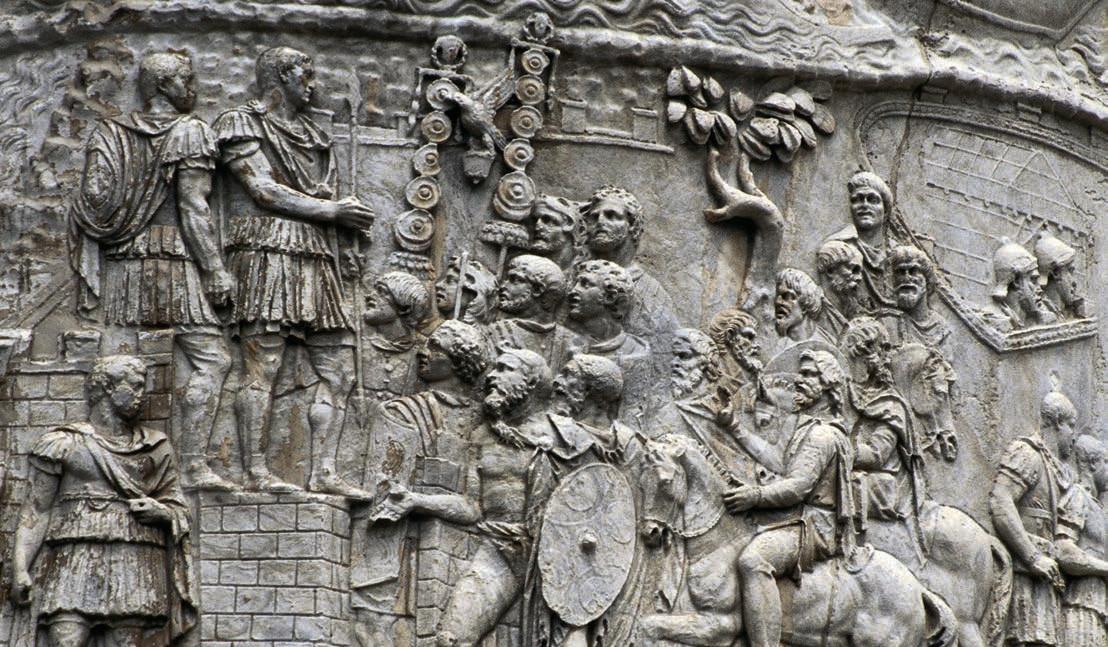




The Cambridge School Classics Project (CSCP) has spent over fifty years fulfilling its original mandate of researching and developing “materials and techniques which will accelerate and improve pupils’ ability to read classical Latin literature and widen their knowledge of classical civilization.” These goals have not changed, and we continue to strive to ensure that our educational materials promote values of inclusion and accessibility, enabling all students and teachers to feel that they have a place in the Classics community and that their contribution is appreciated. These values remain at the heart of this North American 6th edition, and the community that has helped to shape our work.
This Executive Preview contains:
1 An overview of the digital resources
2 Three stages from the Student Book
Our aims in this work were shaped by our community. We engaged with teachers as well as their students and developed our principles of change, affectionately known as the res gerendae Caecilii:
• Preserve the integration of culture, stories, and language learning.
• Maintain the narrative strength of ongoing storylines and characters.
• Ensure suitability and accessibility for all classrooms.
• Improve representation of different sectors of society.
• Update the course to reflect current views on sensitive issues and associated language.
• Ensure cultural background and stories are in line with latest research.
Unit 3 still begins in Britannia where Quintus continues his mission to find Barbillus’ son, Rufus, amid Salvius’ schemes. Familiar characters such as Togidubnus, Dumnorix and Belimicus return, joined by brand-new faces including no-nonsense Aventina and her niece Vilbia. In the latter half of the book, the action shifts to the bustling city of Rome, where Lucia finds herself entangled in the intrigues and complexities of Roman society and politics
Practicing the language is now based on short, tightly engineered stories focused on the language point introduced in About the language, while Reviewing the language offers consolidation exercises for students who need them. The culture sections contain more information which can be investigated using the range of Thinking points and larger, overarching questions. All this provides teachers with an increased choice of approaches and content.
We have taken to heart the principle that “accessible design is good design” and every aspect –from page width to font choice to color contrasts – has been selected to maximize accessibility. Huge thanks to the dyslexic student in one of our trial classrooms who made all the prevaricating worthwhile when she exclaimed (unprompted) “Wow! I can read this textbook easily, that never happens!”
We hope you appreciate this new edition and that your students continue to enjoy the adventures of Quintus and Lucia as they travel the world and experience the diversity of the Roman empire.
Caroline Bristow Director – Cambridge Schools Classics Project
Discover improved digital resources that consolidate knowledge, engage students, and help them build confidence. Students will be able to engage actively with the material and check their understanding, supporting the development of metacognition skills which help them take charge of their learning
• ‘Explore the story’ plus audio embedded in the digital coursebooks, making it easier for learners to gain a deeper understanding of how the language works within the context of the stories.
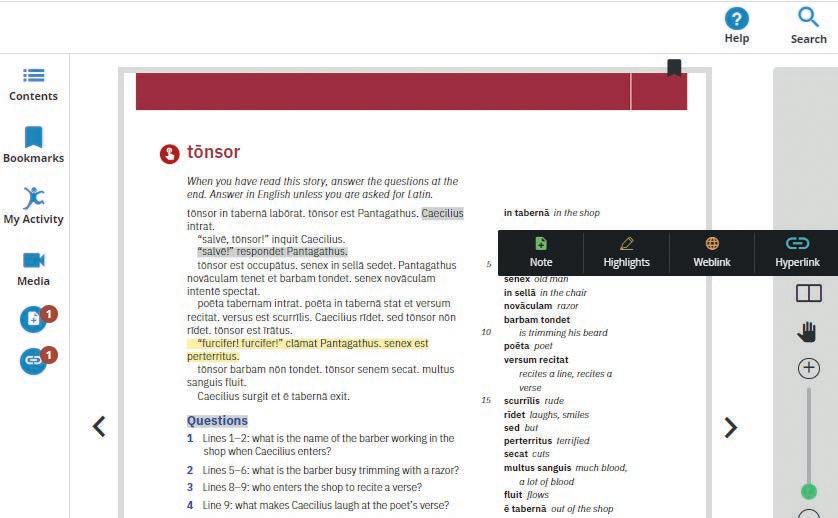

• New! Ability to assign vocabulary, translation and sorting activities, with instant feedback to students on how well they have performed.
• New! Reports to enable teachers to track progress and make data-driven decisions.
• New! Single sign-on with Canvas is coming for districts, so that students have seamless access to the material and don’t need to remember multiple passwords
We listened to what you would value from a digital resource
“I want to be able to assign digital activities in class or as homework”
“I want to be able to see details of which questions an individual student got right/wrong”
“Any digital technology we adopt must comply to accessibility standards”
• New! Accessible digital coursebook, allowing students and teachers to add and share notes, embed links and highlights, and engage more deeply with the content.




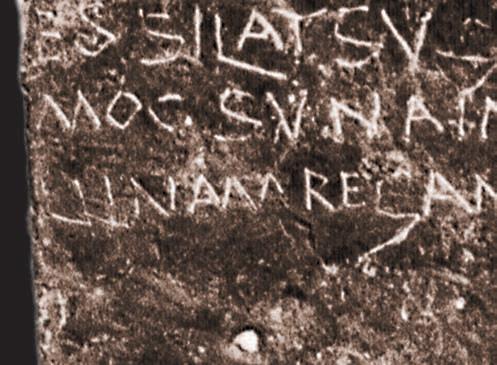


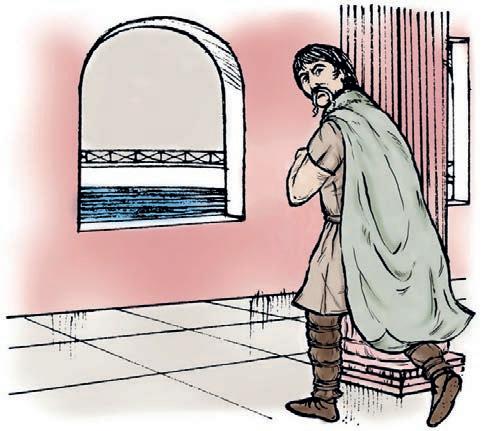
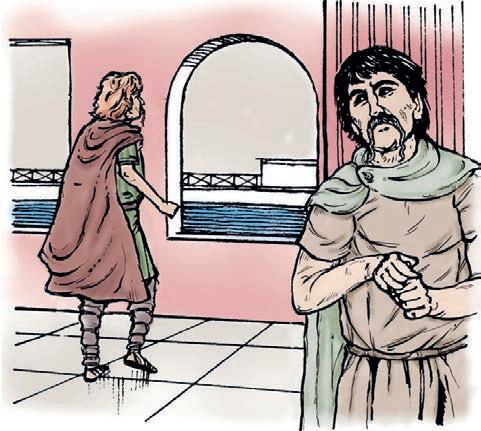
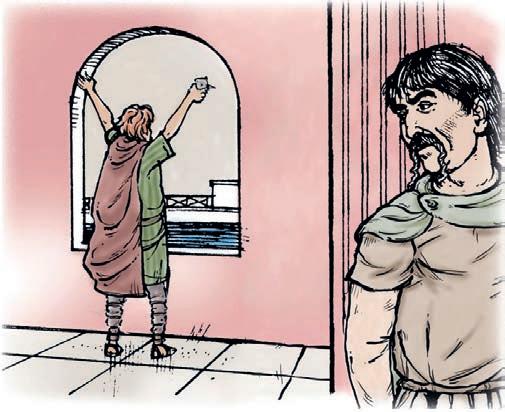
1 Belimicus, quī ad oppidum Aquās Sūlis vēnerat, thermās intrāvit.
Belimicus, thermās ingressus, ad fontem sacrum festīnāvit.
2 Belimicus, prope fontem stāns, Dumnorigem cōnspexit.
Belimicus, Dumnorigem cōnspicātus, post columnam sē cēlāvit.
3 Dumnorix, parvam tabulam tenēns, ad fontem prōcessit.
Dumnorix, ad fontem prōgressus, manūs ad caelum sustulit et deae Sūlī tabulam obtulit.

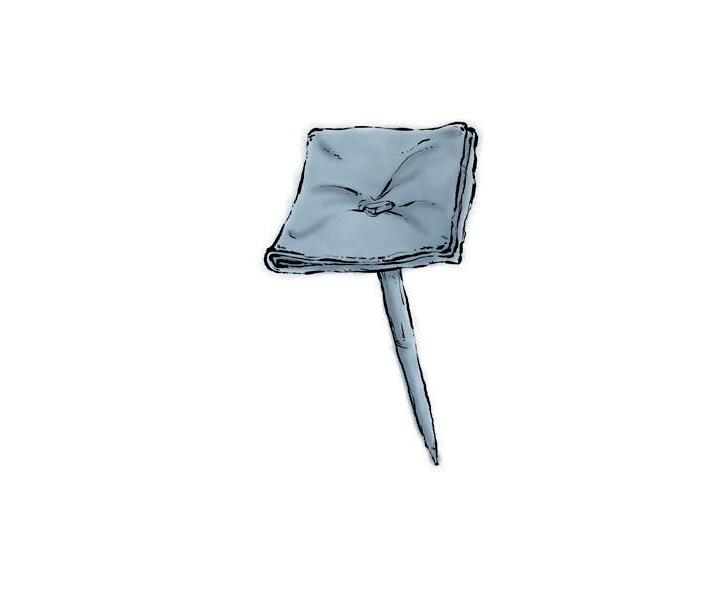

4 Belimicus, quī parvam tabulam vīderat, ad fontem cautē revēnit. Belimicus, ad fontem regressus, precēs Dumnorigis plānē audīvit.
5 Dumnorix, deam precātus, tabulam in fontem iniēcit et dīxit: “mortem inimīcīs Togidubnī!”
6 Dumnorix, haec verba locūtus, ē thermīs exiit. Belimicus ā font e contendit, attonitus.
erat vīlla nova prope thermās. in ātriō huius vīllae garriēbant Quīntus et Dumnorix. illī exspectābant Aventīnam, quae vīllam nūper ēmerat et Dumnorigem bene nōverat. Aventīna erat fēmina magnae dīligentiae et summae benignitātis.
mox ancilla iānuam aperuit, quod domina revēnerat. Dumnorix, Aventīnam cōnspicātus, statim surrēxit.
“exspectātissima es, Aventīna nostra!” inquit. “quid agit rēx?”
“morbus nōn peior est,” respondit Aventīna. “omnia mandāta, quae rēgīna Catia tibi dederat, cum summā cūrā effēcī.”
“bene,” inquit prīnceps. “tibi gratiās maximās agimus, Aventīna. dē Togidubnō sollicitī sumus.”
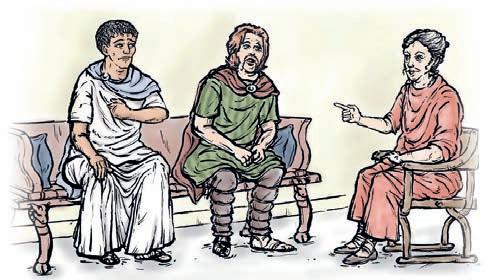
Dumnorix, haec verba locūtus, prope Aventīnam cōnsēdit.
Aventīna: Vilbia autem, fīlia meī frātris, mihi aliquid novī rettulit.
Dumnorix: hanc rem audīre velim. Vilbia est puella maximae prūdentiae.
Aventīna: tabernam possideō in extrēmā parte oppidī. hanc tabernam, ubi aliquandō Vilbia labōrat, prīnceps quīdam vīsitāre solet. vīsne mē illum prīncipem hūc invītāre? nōmen eius est Belimicus.
Quīntus: ēheu! ille prīnceps est vir ingeniī prāvī.
Aventīna: quid? vērum dīcis?
Quīntus: prīncipem Cantiacōrum bene nōvimus.
Dumnorix: nōlī timēre, Aventīna mea! paulum perīculī est. Dumnorix, fortissimus prīncipum, adest!
Quīntus: sine dubiō Belimicus ad oppidum Aquās Sūlis vēnit, quod ultiōnem petit.
Dumnorix: mī Quīnte, nōlī illam pestem commemorāre! iste Belimicus, saepe dē ultiōne locūtus, nihil umquam effēcit. ( rīdēns ) praetereā ego sum leō, iste rīdiculus mūs. semper eum superāre possum.
Aventīna: fortasse tū fortior es quam Mārs ipse, mī amīce. ego tamen Belimicō vix crēdere possum. volō tē in tabernā eī obviam īre.
dīligentiae: dīligentia carefulness, attentiveness benignitātis: benignitās kindness cōnspicātus having caught sight of peior worse
locūtus having spoken autem but rettulit: referre tell, report extrēmā parte: extrēma pars edge
prāvī: prāvus evil paulum perīculī little danger
ultiōnem: ultiō revenge
praetereā besides mūs mouse
Mārs Mars (god of war) obviam īre (go to) meet



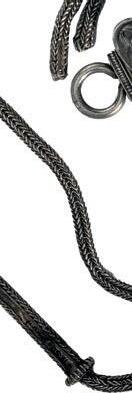
Two silver brooches joined by a chain.






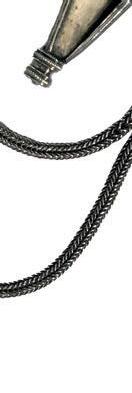


prīdiē prōcēdit Aventīna ad tabernam, in quā labōrat Vilbia. tabernam ingressa, Aventīna Vilbiam petit, cui ōsculum dat.
Aventīna: mea lūx! quid hodiē agis?
Vilbia: ( misera ) tam occupāta sum, amita! ecce, pōcula sordida ubīque iacent. mihi necesse est omnia lavāre. nimium labōris habeō. pōcula lavāre diūtius nōlō.
Aventīna: mea Vilbia, tibi favet fortūna. pater tuus nūntium ad mē mīsit: “domum nūper rediī. Vilbiam exspectō.” placetne?
Vilbia: ( Aventīnam amplexa ) mihi placet, amita cārissima!
Vilbia autem, haec locūta, pōculum lavāre nōn incipit. amitae fībulam ostendit. Aventīna fībulam, quam fīlia frātris tenet, intentē spectat.
Aventīna: quam pulchra, quam pretiōsa est haec fībula, mea Vilbia. eam īnspicere velim. num argentea est?
Vilbia: sānē argentea est. herī prīnceps Britannicus, cui pōculum vīnī praebēbam, eam mihi grātīs dedit.
Aventīna: ( sollicita ) quālis est hic prīnceps? estne homō probus aut mendāx?
Vilbia: nescio. eum in hōc oppidō numquam anteā vīdī. fortasse rēgem Togidubnum colere vult. ( anxia ) quid prōpōnis, amita? vīsne mē fībulam prīncipī reddere? adeō cupiō eam retinēre. tam pulchra est. quid facere dēbeō?
Aventīna: ( rem breviter cōgitāns ) nōs hunc prīncipem cavēre dēbēmus. nēmō tālia dōna grātīs dat.
Vilbia, amitam iterum amplexa, pōculum lavāre incipit, cantāns.
In the story in vīllā Aventīnae, Aventina was described as fēmina magnae dīligentiae et summae benignitātis, and Vilbia was described as puella maximae prūdentiae
To what extent do you think that these are good or bad descriptions of these characters? Support your answers with examples from the stories you have read so far.
fībula brooch, decorative pin
ingressa having entered ōsculum kiss mea lūx! light of my life! amita aunt
amplexa having hugged incipit: incipere begin, start sānē obviously grātīs free quālis what sort of person?
breviter briefly
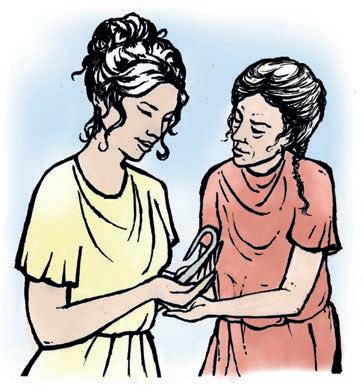
1 In Stage 21, you met sentences containing perfect passive participles: rēx, ā Rōmānīs honōrātus , semper fidēlis manēbat.
The king, having been honored by the Romans, always remained loyal. puellae, ā patre laudātae , rīdēbant.
The girls, having been praised by their father, were smiling.
2 In Stage 22, you have met another kind o f perfect participle. Study the way it is translated in the following examples:
Vilbia, tabernam ingressa , Aventīnae fībulam ostendit.
Vilbia, having entered the inn, showed the brooch to Aventina. senex, deam precātus , abiit.
The old man, having prayed to the goddess, went away.
The words in bold are perfect active participles
Like other participles they change their endings to agree with the nouns they describe. Compare the following pair of sentences: singular puer, mīlitēs cōnspicātus , valdē timēbat. plural puerī, mīlitēs cōnspicātī , valdē timēbant.
3 Translate the fol lowing examples:
a Dumnorix, vīllam ingressus, Av entīnam cōnspexit.
b rēgīna, multa verba locūta, tandem tacuit
c mercātōrēs, ad f orum prōgressī, negōtium agere coepērunt.
d fēmina, deam Sūlem precāta, dōnum in aquam iniēcit.
e puellae, equum cōnspicātae, eum īnspicere volēbant.
perfect passive participles: page 6
In each sentence, pick out the perfect active participle and the noun which it describes. State whether each pair is singular or plural.
4 Only a small group of verbs have a perfect active participle; they do not have a perfect passive participle.
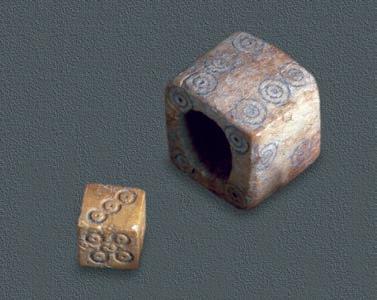
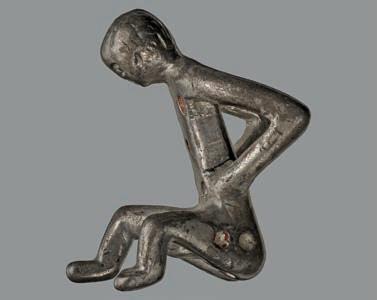
The Romans were very fond of games involving types of dice, both the kind we are used to (left), and more novel varieties such as the little man (right), who can fall six ways up; here he scores 2. The larger of the cubic dice has a hollow in it, possibly for loading the dice.
scaena prīma
diēs vesperāscit. Vilbia in tabernā hūc illūc ruit, quod tam occupāta est. Dumnorix, ab Aventīnā missus, cum Belimicō āleam lūdit. Dumnorix
Belimicō multam pecūniam dēbet.
Belimicus: quid agit Togidubnus? valēscitne? heus! Venerem iēcī! caupō! iubeō t ē plūs cibī ferre.
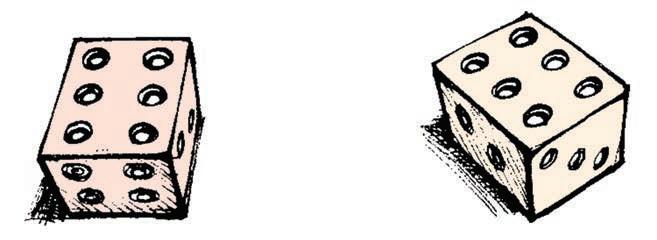
Dumnorix: cotīdiē valēscit rēx. nunc tacē, amīce! ego āleās iaciō.
Belimicus: hercle! quam īnfēlīx es, Dumnorix! canem iterum iēcistī. alium dēnārium mihi dēbēs.
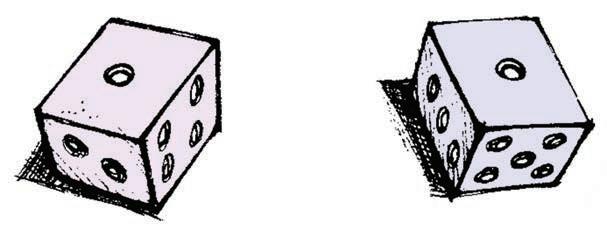
Dumnorix: satis pecūniae iam āmīsī. accipe dēnāriōs quōs tibi dēbeō, Belimice. ad vīllam Aventīnae redeō.
(Dumnorix, haec locūtus, ē tabernā exit. simul Vilbia, plūs cibī portāns, Belimicō appropinquat.)
Belimicus: ( cachinnāns ) tanta est stul titia hōrum Rēgnēnsium! Dumnorix, ā mē dēceptus, multam pecūniam āmīsit. sed Togidubnus, nūllam fraudem suspicātus, etiam īnfēlīcior est. melius est eī cavēre. rēgī nōn tūtum est thermās huius oppidī vīsitāre.
(Vilbia, ubi verba Belimicī audīvit, est attonita.)
Vilbia: ( sēcum cōgitāns ) nōnne prīnceps , quī Dumnorigem dēcēpit, est homō magnae arrogantiae? porrō, rēx Togidubnus, vir summae auctōritātis, in magnō perīculō est. ēheu! necesse est mihi quam celerrimē Dumnorigem monēre.
(exit currēns.)
hūc illūc here and there, up and down āleam lūdit is playing dice
5
Venerem: Venus Venus (highest dice throw)
canem: canis dog (lowest dice throw)
stultitia foolishness
fraudem: fraus trick suspicātus having suspected arrogantiae: arrog antia arrogance, excessive pride
Vilbia, ē tabernā ēgressa, per silentium noctis currit. Dumnorix, quī prope fontem deae Sūlis stat, Vilbiam currentem videt.
Dumnorix: Vilbia? quid quaeris? puellīs nōn tūtum est per viās noctū īre. domī manēre dēbēs
Vilbia: ( commōta ) ā tabernā, in quā sedet Belimicus , cucurrī.
Dumnorix: ( attonitus ) Diāna alter a es! celerius quam cerva cucurristī.
Vilbia: rēx Togidubnus in maximō perīculō est.
Dumnorix: quid dīcis? volō tē mihi tōtam rem explicāre, Vilbia.
Vilbia: thermās vīsitāre nōn dēbet rēx. nam aliquis in hōc oppidō Togidubnum laedere cupit
Dumnorix: quō modō hoc cognōvistī?
Vilbia: prīnceps Cantiacōrum, postquam ē tabernā exiistī, id apertē dīxit.
Dumnorix: hercle! Togidubnum saepe monuī, “nōlī Cantiacīs crēdere, praesertim Belimicō.”
Vilbia: sine dubiō Belimicus vir perfidus est.
Dumn orix: ita vērō, Vilbia. nunc abī! fortasse dea Sūlis mihi cōnsilium dare potest.
(exit Vilbia. Dumnorix prope fontem sacrum manet manūsque ad caelum tollit.)
Dumnorix: ō dea Sūlis! auxilium ā tē iam petīvī. tē precātus, tabulam plumbeam in f ontem sacrum iniēcī. dīra imprecātiō, in tabulā scrīpta, iam in fonte tuā iacet. volō tē precēs meās audīre. paulīsper silentium est. tum “ehem!” audit Dumnorix. sē vertēns, Belimicum videt. ad Dumnorigem prōgressus, Belimicus īrātus eum vituperāre incipit.
Belimicus: quid dicēbās, furcifer? auxilium ā deā Sūle petis? asine! tē ipsum in f ontem sacrum inicere velim.
Dumnorix: mī amīce, verba tua cum summā cūrā ēligere dēbēs . tibi perīculōsum est aquae appropinquāre.
(Vilbia, ad fontem regressa, ubi clāmōrēs audīvit, post columnam sē cēlat.)
Belimicus: homuncule! Vilbiam auferre audēs? porrō, ista puella es t fūr. ubi est fībula argentea mea, quam Vilbia abstulit?
Dumnorix: īnsānus es, Belimice. melius est tibi domum redīre
Belimicus: audēsne mihi ita dīcere, Dumnorix? ( gladium dēstringēns ) nēmō mē impūne v exat.
ēgressa having gone out noctū at night
Diāna Diana (goddess of hunting) alt era another, a second aliquis someone apertē openly praesertim especially perfidus treacherous, untrustworthy precātus having prayed to tabulam: tabula (writing) tablet dīra dreadful imprecātiō curse prōgressus having advanced regressa having returned 5 10 15 20 25 30 35
(Vilbia invīsa Belimicō appropinquat. puella prīncipem, simulac tergum vertit, in aquam dēicit.)
Dumnorix: ( susurrāns ) optimē fēcis tī! sed nōlō tē ad illam tabernam redīre, Vilbia. tibi perīculōsum est in hōc oppidō manēre.
Vilbia: consentiō. tūtius est mihi Dēvam redīre, ubi mē exspectat pater.
exeunt Dumnorix et Vilbia. Belimicus ē fonte cum magnā difficultāte madidus sē extrahit et abit saeviēns.
40
invīsa unseen tergum back Dēvam to Chester difficul tāte: difficultās difficulty madidus soaking wet

The reservoir of the spring as it is today.
1 In Unit 2, you met examples of the genitive case like these:
marītus Galatēae erat Aristō. The husband of Galatea was Aristo. prō templō Caesaris stat āra.
In front of the Temple of Caesar stands an altar.
2 In Stage 21, you met another use of the genitive. Study the following examples: satis pecūniae enough money , literally, enough of money nimium vīnī too much wine plūs sanguinis more blood multum cibī much food
Each phrase is made up of two words:
a A word like plūs or nimium indicating an amount or quantity.
b A noun in the genitive case.
3 Further examples:
a nimium pecūniae
b nihil perīculī
4 In Stage 22, you have met examples like these:
c plūs labōris
d multum aquae
fēmina ingeniī prāvī vir minimae auctōritātis a woman of evil charact er a man of very little authority
In both examples , a noun ( fēmina , vir ) is described by another noun and an adjective both in the genitive case. Such phrases can be translated in different ways. For example:
puella magnae virtūtis homō summae benignitātis a girl of great courage a man of the utmost kindness Or, in more natur al English: Or, in more natural English: a very courageous girl a very kind man
5 Further examples:
a homō magnae prūdentiae
b iuvenis vīgintī annōrum
c fēmina magnae dignitātis
d fābula huius modī
e puella maximae calliditātis
f vir ingeniī optimī
1 In Stage 21, you met the following pattern: adjectives adverbs
laetus, laeta happy laet ē happily perītus, perīta skillful perit ē skillfully
2 Study another common pattern of adjectiv es and adverbs: adjectives adverbs brevis short brevi ter shortly ferōx fierce ferōci ter fiercely
3 Using this pattern as a guide, work out the w ords that are missing from this table: suāvis sweet suāviter neglegēns . . .
. . neglegenter carelessly audāx audācter
4 Divide the following words into tw o lists, one of adjectives and one of adverbs. Then give the meaning of each word. fortis; fidēliter; īnsolēns; fortiter; sapienter; īnsolenter; fidēlis; sapiēns.
5 Choose the correct Latin word t o translate the words in bold in the following sentences:
a Vilbia was a sensible young person. (prūdēns, prūdenter)
b Salvius rode quickly into the courtyard. (celer, celeriter)
c Belimicus was happy because he had eaten w ell. (laetus, laetē)
d The soldier always worked diligently . (dīligēns, dīligenter)
e Aventina listened ver y sadly to Dumnorix. (trīstissima, trīstissimē)
6 Notice the different pattern f or these two adjectives and their related adverbs: adjectives adverbs facilis easy facil e easily difficilis difficult difficil ē with difficulty
In the town of Aquae Sulis, two Roman soldiers attempt to capture a thief. duo mīlitēs Rōmānī ad tabernam quondam ambulābant. alter Crīspus, alter Frontō erat. Crīspus vītam dēplōrābat, quod pallium novum āmīserat. Frontō, quamquam amīcus Crīspī erat, eum dērīdēbat.
“umquam fuit mīles neglegentior quam tū, Crīspe?” inquit. “quō modō pallium āmīsistī?”
“thermās ingressus, servō pallium trādidī.” respondit Crīspus miser. “tum vestīmenta in apodytēriō dēposuī et balneum intrāvī. ēheu! ē balneō ēgressus, neque servum neque pallium invēnī.”
“mīles minimae prūdentiae es,” inquit Frontō. “sānē fūr persōnam servī agēbat.”
subitō Crīspus hominem pallium gerentem cōnspicātus, “heus!” clāmāvit. “pallium meum geris! venī hūc!”
ille tamen, ā Crīspō vocātus, statim fūgit. amīcī eum agitāre coepērunt. per multās viās oppidī fūrem persecūtī, eum tandem in viā dēsertā invēnērunt.
“effugere nōn potes!” clāmāvit Frontō. “mīlitēs Rōmānī sunt callidiōrēs quam vōs Brittunculī!”
fūr, ā Frontōne vituperātus, pallium Crīspō reddidit. tum Frontō attonitus
“hercle!” exclāmāvit. “pugiō meus abest!”
fūr, quī pugiōnem Frontōnis cēperat, “valēte, amīcī!” clāmāvit, et fūgit rīdēns.
1 Explore the story
a Lines 1–2: what are we told about Crispus and Fr onto here?
b Look at lines 2–3.
i Why was Crispus complaining about his life?
ii How was Fronto reacting to Crispus’ complaints?
c Lines 4–5: what two questions did Front o ask Crispus?
d Look at lines 6–8.
i What had Crispus done immediately after going into the baths?
ii What had Crispus done before he entered the bath itself?
iii What problem had Crispus faced after getting out of the bath?
pallium cloak
dēplōrābat: dēplōrāre complain about
minimae: minimus very little persōnam . . . agēbat: persōnam agere play the part (of)
persecūtī: persecūtus having pursued
Brittunculī: Brittunculus poor little Briton
e Lines 9–10: what explanation did Front o offer for what had happened at the baths?
f Look at lines 11–12.
i Why did Crispus shout at the man?
ii What did Crispus want the man to do?
g Look at lines 13–15.
i What did the man do after being called by Crispus?
ii What did Crispus and Fronto do in response to this?
h Lines 16–17: what claim did Fronto make?
i Line 18: what are we told here about the fūr ?
j Look at lines 18–22.
i What did Fronto notice?
ii What had the fūr done?
iii What two things did the fūr do at the end of the story?
2 Explore the language
Romans enjoyed different types of humor, including wordplay, satire, and farce. Traditional elements of a farce include deception, slapstick, disguises, coincidences, and sudden twists. What elements of Roman farce can you find in this story?
3 Explore further
This story is inspired not only by Roman comedy but also by one of the dēfīxiōnēs found at Aquae Sulis. These tablets are one way in which we can see what ordinary people were thinking about: in this case, theft!
You have met other types of written Latin which give us glimpses into the lives of ordinary people. What kinds of things can we learn from a tombstones?
b graffiti and wall paintings?
c letters s u ch as the Vindolanda tablets?
d business documents such as Caecilius’ accounts?
Reviewing the language Stage 22: page XXX
The UNESCO Memory of the World program records remarkable and important pieces of cultural heritage from all over the world. In 2014 the curse tablets found at Bath (Aquae Sulis) became the only items from Roman Britain to be added to the UK Memory of the World Register. Why might the Bath curse tablets have been recognized in this way?
When excavating Roman religious sites, such as the spring at Aquae Sulis, archaeologists sometimes find small sheets of lead or pewter inscribed with curses which call for the punishment of an enemy. These are called dēfīxiōnēs (curse tablets) and over 300 have been found in Britain alone. These tablets give historians a rare glimpse into the lives of ordinary people, directly and in their own words.
The method of putting a curse on someone followed a general formula. The name of the offender, if known, was written on a tablet along with details of the crime. A god was then called upon to punish them, often in a very unpleasant way. If the exact offender was unknown, the tablet might contain a list of suspects or, if there were not even any suspects, a vague statement about the possible culprit such as “whether enslaved or free, whether man or woman.” The completed tablet was rolled or folded up and “delivered” to the gods. In Britain, almost all curses were placed in temples, household shrines, or somewhere with water, such as a well or spring. Elsewhere in the empire, they were often buried in tombs so that the dead could either carry out the curse or deliver it to the gods of the underworld.
Around 130 curse tablets have been found in the sacred spring at Aquae Sulis (around 117 of which have writing that can be read). Some curses were very simple: just “I dedicate,” followed by the intended victim’s name; however, they could also be brutal and vivid in their requests for punishment.
BASILIA GIVES TO THE TEMPLE OF MARS HER SILVER RING, THAT SO LONG AS SOMEONE, SLAVE OR FREE, KEEPS SILENT OR KNOWS ANYTHING ABOUT IT, HE MAY BE ACCURSED IN HIS BLOOD AND EYES AND EVERY LIMB, OR EVEN HAVE ALL HIS INTESTINES ENTIRELY EATEN AWAY, IF HE HAS STOLEN THE RING OR BEEN AN ACCOMPLICE.

DOCILIANUS, SON OF BRUCERUS, TO THE MOST HOLY GODDESS SULIS. I CURSE HIM WHO HAS STOLEN MY HOODED CLOAK, WHETHER MAN OR WOMAN, WHETHER SLAVE OR FREE, THAT . . . THE GODDESS SULIS INFLICT DEATH UPON . . . AND NOT ALLOW HIM SLEEP OR CHILDREN NOW OR IN THE FUTURE, UNTIL HE HAS BROUGHT MY HOODED CLOAK TO THE TEMPLE OF HER DIVINITY.
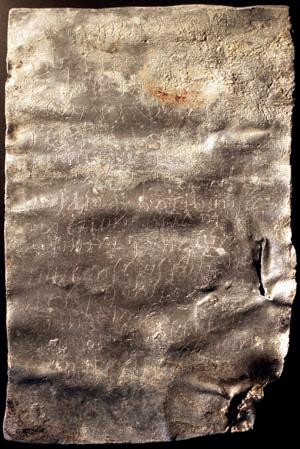
This curse tablet asks the Roman god Neptune and Niskus (possibly a local river god) to punish a thief of gold and silver coins. It was found in a small river near Southampton. Other curse tablets appealing to Neptune have been found in the River Thames in London, the Little Ouse in Norfolk, and the Tas in Suffolk.

Thinking point 1: For each of these curse tablets identify who is doing the cursing and why. Neither of these people knew who had stolen their property. How do they get around this when writing their curse?
One of the most famous tablets of Aquae Sulis is this one, which inspired the character of Vilbia in this Stage:

MAY HE WHO HAS STOLEN VILBIA FROM ME DISSOLVE LIKE WATER. MAY SHE WHO HAS DEVOURED HER BE STRUCK DUMB, WHETHER IT BE VELVINNA, EXSUPEREUS, VERIANUS SEVERINUS, AUGUSTALIS, COMITIANUS, CATUS, MINIANUS, GERMANILLA, OR JOVINA.
This example illustrates how difficult curse tablets can be to read and interpret. The author of this curse tablet was once assumed to be a jealous lover, but this is no longer a popular view among historians. Most curse tablets found in Britain deal with the theft of items such as jewelry and clothing. This would suggest that, rather than a girlfriend, Vilbia was an enslaved woman who was considered someone’s property. It is also possible that the curse refers to an actual object; the word vilbia may be a corruption of fibula (brooch). Some historians have suggested that it may be a lost British word for a pointed tool.
Thinking point 2: Explain how historians’ understanding of the Vilbia tablet has changed and the possible interpretations that have been suggested.
The Vilbia curse, like many others, was written backward to increase the mystery of the process and perhaps the strength of the curse. Curse tablets found elsewhere in the empire, especially in big cities such as Rome and Carthage, sometimes add magical words with no apparent meaning in human language such as bescu, berebescu, bazagra (rather like “abracadabra,” a word which actually appears in the ancient Greek Magical Papyri).
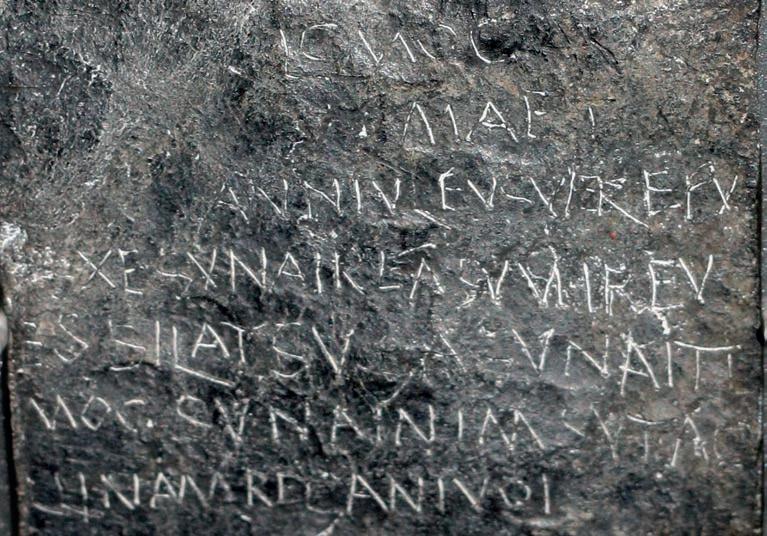
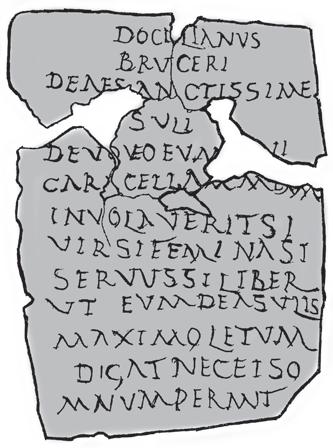
A
of
Thinking point 3: In what ways are British curse tablets different from those found elsewhere in the empire?
It has been suggested that the following tablet found at the Temple of Mercury at Uley – about 22 miles (35 kilometers) north of Aquae Sulis – was written by the same Docilianus who asked Sulis to punish the thief who stole his cloak:

TO THE GOD MERCURY FROM DOCILINUS . . . VARIANUS AND PEREGRINA AND SABINIANUS, WHO HAVE BROUGHT EVIL HARM ON MY BEAST AND ARE . . . I ASK YOU TO DRIVE THEM TO THE GREATEST DEATH, AND DO NOT ALLOW THEM HEALTH OR SLEEP UNLESS THEY PAY BACK TO YOU WHAT THEY HAVE DONE TO ME.
This is the only example in Britain of two different tablets thought to be by the same person. The names Docilinus and Docilianus may be different Romanized spellings of the British name Docca. The handwriting on the tablets also seems to match, and the punishments requested are very similar in nature.
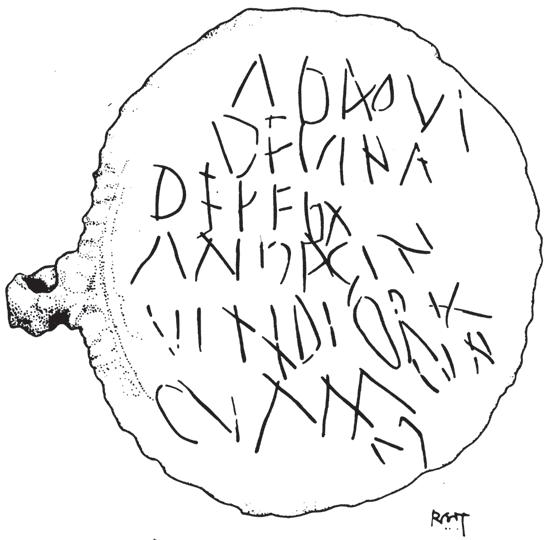
This defixio has a small ring at one end, suggesting it may have been a pendant that was repurposed as a curse tablet. The inscription lists a mix of Roman and “Celtic” names which have been Latinized, perhaps the intended victims of the curse.
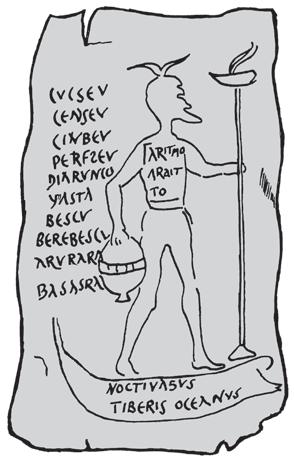
Some curse tablets from elsewhere in the Roman world include a roughly drawn figure, such as this example from the region of modern Tunisia. A bearded spirit stands in a boat carrying an urn and a torch, symbols of death. None of the curse tablets found in Britain contain pictures.
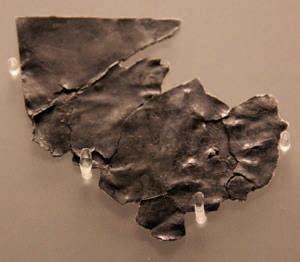
This curse tablet is unique. You may not be able to see them, but the letters are from the Latin alphabet, while the words they spell seem to be in an indigenous British language.
Although not everyone in the ancient world approved of or believed in such practices, it is important to remember that rituals like curses were part of everyday life. Individuals such as Docilianus would not have called repeatedly on the gods if they did not think their curses worked. Spells, charms, and recipes have also survived which claim to offer protection against magic and curses.
“There is indeed no one who does not fear being spell-bound by means of evil curses.” (Pliny the Elder, Natural History 28.4)
Due to their widespread use and very personal nature, curse tablets provide historians with valuable evidence about the everyday lives of a huge range of people.
No community ever lives in complete harmony, and practices such as curse tablets gave people a way to feel more in control of their problems. When there was no human way of righting a wrong, perhaps because there was no way of knowing who was to blame, a person could appeal to the supernatural for help. This might have helped them to feel less powerless or give them hope for future justice. Cursing the person who stole his cloak might have brought Docilianus some peace; at least the unknown thief would not get away with it. The possibility of being cursed may also have affected those with a guilty conscience: perhaps the threat of divine justice would weigh heavily. A thief might initially dismiss the power of curses, but the next time a business deal went wrong or they suffered an injury they might have felt a little anxious: what if . . .?

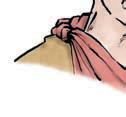


The UNESCO Memory of the World program records remarkable and important pieces of cultural heritage from all over the world. In 2014 the curse tablets found at Bath (Aquae Sulis) became the only items from Roman Britain to be added to the UK Memory of the World Register. Why might the Bath curse tablets have been recognized in this way?
Entries on the UK Memory of the World Register must meet at least one of the following criteria. You may wish to consider which of these, if any, you think the Bath tablets meet.
• Time – is it representative of its time?
• Place – does it highlight certain features of the place where it was created?
• People – does it illustrate a significant aspect of human social, industrial, or artistic development?
• Subject and theme – does it relate to something historically or intellectually important?
• Form and style – is it an outstanding example of a certain type of thing?
• Social/spiritual/community significance – is the community emotionally attached to it or does it contribute to that community’s sense of identity?
caelum, caelī, n sky cēlō, cēlāre, cēlāvī, cēlātus hide ēgressus, ēgressa, ēgressum
having gone out iaciō, iacere, iēcī, iactus throw incipiō, incipere, incēpī, inceptus begin, start īnfēlīx, gen. īnfēlīcis unlucky ingressus, ingressa, ingressum having entered locūtus, locūta, locūtum having spoken moneō, monēre, monuī, monitus warn, advise -ne (turns a statement into a question) plūs, gen . plūris more praebeō, praebēre, praebuī, praebitus offer, provide precātus, precāta, precātum having prayed (to) prōgressus, prōgressa, prōgressum having advanced quīdam, quaedam, quoddam one, a certain quō modō? how? in what way? regressus, regressa, regressum having returned simul at the same time tālis, tāle such verbum, verbī, n. word



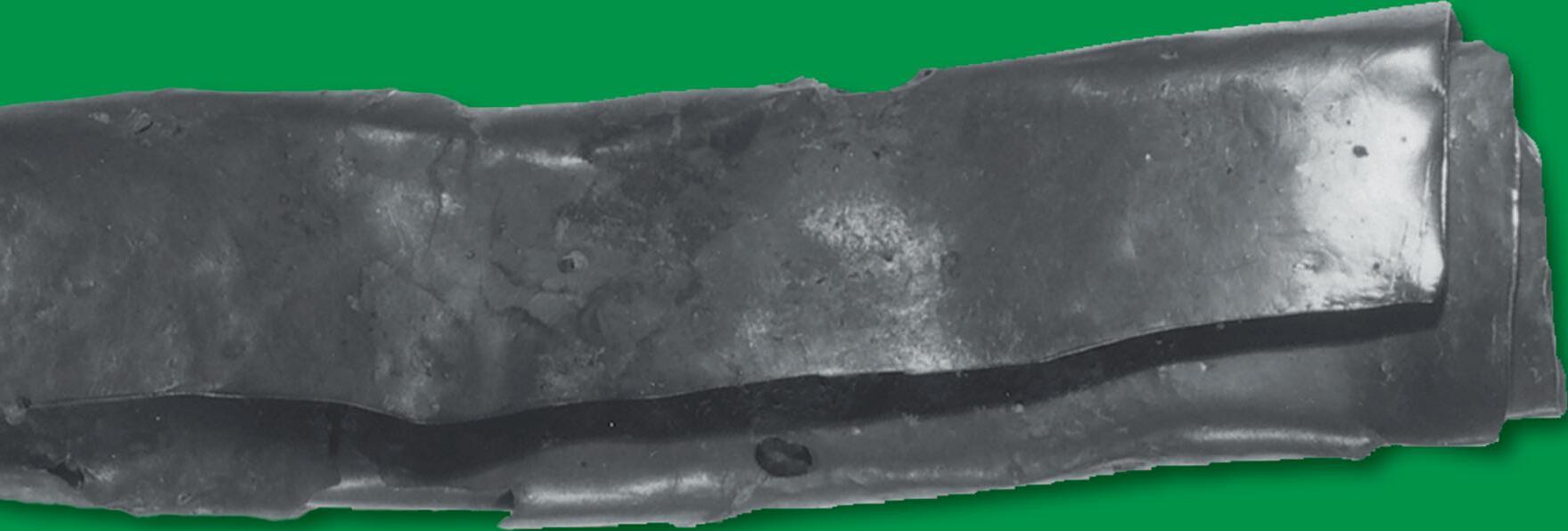
One of the Bath curse tablets, folded as it was when it was found.



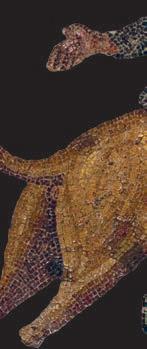








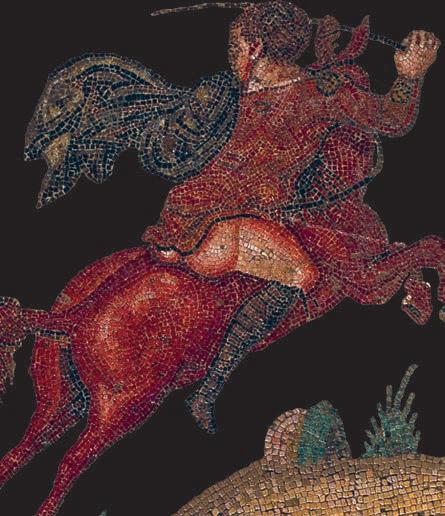

Aventīna et Vilbia, ex oppidō Aquīs Sūlis ēgressae, Dēvam in plaustrō iter faciēbant. in itinere ad flūmen altum et lātum vēnērunt, ubi erat pōns. cum ad pontem vēnissent, Aventīna exclāmāvit
“ēheu! pōns sēmirutus est.»
subitō nūntius Rōmānus appāruit equitāns.
“cēdite!” clāmāvit. “epistulam magnī momentī ferō.”
“cavē pontem īnfirmum,” inquit Aventīna. nūntius igitur ex equō dēscendit. cum dēscendisset, equus statim trānsiit.
“nimis cauta es!” Aventīnae dīxit nūntius. “ecce! nihil perīculī est.”
nūntius, cum haec dīxisset, trānsīre coepit. cum ad medium pontem vēnisset, dēcidit pōns, dēcidit nūntius. Vilbia rīsit.
“mālim cauta esse potius quam caudex!”
10
altum: altus deep
lātum: lātus wide cum when sēmirutus rickety
mālim I would prefer potius rather 5
magnī momentī of great importance
trānsiit: trānsīre cross

The movement of people and goods throughout the provinces of the Roman Empire was made possible by its network of roads, which at its peak is estimated to have stretched 57,000 miles (92,000 kilometers). Each section of road took the shortest possible route across plains, forests, mountains, rivers, valleys, marshes, and deserts, with tunnels and bridges where necessary. They had to divert around river valleys and impassable mountains, but once past the obstructions, the roads usually continued along their original line. A fully paved Roman road usually lasted eighty to a hundred years. Some are even still in use today and many modern European roads still follow the Roman routes.
After the line was chosen, a cut the width of the planned road (between 6 and 20 feet, or between 2 and 6 meters) was made. This needed to be deep enough to hold the four layers that would make up the road (up to 5 feet, or 1.5 meters). If the earth was soft at that depth, piles (wooden posts) were driven in to strengthen it. A footing of large stones was then laid at the bottom of the trench. This was covered with a layer of smaller stones, concrete, or rubble, and then a layer of rolled sand concrete. The road surface (pavīmentum ) was made of local materials, usually large, flat paving stones. This final surface was curved to provide effective drainage. The Romans liked to raise their roadways on an embankment of earth just over 3 feet (about 1 meter) high, called an agger , to aid drainage and give marching troops a good view of the territory. Ditches on either side of the agger also provided drainage.
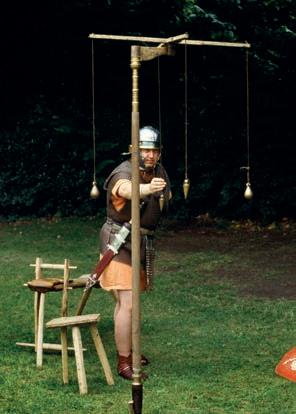
Thinking point: Roads were a vital part of Rome’s imperial infrastructure. How do you think good roads helped the Romans to maintain their empire?

Military surveyors used an instrument called a groma (pictured) to make sure the roads were straight. Where trees or hills were in the way, they took sightings from high points using smoke from fires.

A stretch of Roman road in Britain known as Wade’s Causeway. In local legend, Wade was a giant who was said to have built the road by throwing stones at his wife. Only the lower layers of road remain; the road surface has disappeared over the centuries.
Once you have read this story, answer the questions at the end.
cum Togidubnus trīstis īrātusque ē vīllā Memoris exiisset, Salvius quīnquāgintā mīlitēs arcessīvit. eōs iussit rēgem prīncipēsque Rēgnēnsium comprehendere et in carcere retinēre. hī mīlitēs, tōtum per oppidum missī, mox eōs invēnērunt. Dumnorix tamen, ē manibus mīlitum noctū ēlāpsus, Quīntum quaesīvit, quod eī crēdēbat.
cubiculum Quīntī ingressus, haec dīxit:
“amīce, tibi crēdere possum. adiuvā mē, adiuvā Togidubnum. paucīs Rōmānīs crēdō; plūrimī sunt perfidī. nēmō quidem perfidior est quam iste Salvius quī Togidubnum interficere nūper temptāvit. nunc Togidubnus, ā mīlitibus Salviī comprehēnsus, in carcere iacet. rēx omnīnō dē vītā suā dēspērat.
“tū tamen es vir summae virtūtis magnaeque prūdentiae. quamquam Salvius potentissimus est, nōlī rēgem, amīcum tuum, dēserere. nōlī eum in carcere inclūsum relinquere. tū anteā eum servāvistī. nōnne iterum servāre potes?”
cum Dumnorix haec dīxisset, Quīntus rem sēcum anxius cōgitābat. auxilium Togidubnō ferre volēbat, quod eum valdē dīligēbat; sed rēs difficillima erat. subitō cōnsilium cēpit.
“nōlī dēspērāre!” inquit. “rēgī auxilium ferre possumus. hanc rem lēgātō Gnaeō Iūliō Agricolae clam referre dēbēmus. itaque nōbīs festīnandum est ad ultimās partēs īnsulae ubi Agricola bellum gerit. Agricola sōlus Salviō obstāre potest, quod summam potestātem in Britanniā habet. nunc nōbīs hinc effugiendum est.”
Dumnorix, cum haec audīvisset, cōnsilium audāx magnopere laudāvit. tum pistōrem vīcīnum arcessīvit, cui mandāta dedit. pistor exiit. mox regressus, cibum quīnque diērum Quīntō et Dumnorigī trādidit. illī, ē vīllā ēlāpsī, equōs cōnscendērunt et ad Agricolam abiērunt.

carcere: carcer prison ēlāpsus having escaped quidem indeed
omnīnō completely
virtūtis: virtūs courage, virtue
inclūsum: inclūsus imprisoned dīligēbat: dīligere be fond of
lēgātō: lēgā tus governor nōbīs festīnandum est we must hurry ultimās: ultimus furthest potestā tem: potestās power nōbīs … effugiendum est we must escape
cōnscendērunt: cōnsc endere mount, climb onto
1 Line X: what two emotions did Togidubnus feel as he left Memor’s house?
2 Lines X–X: what orders did Salvius give the fifty soldiers?
3 Look at lines X–X.
a Which Latin word show s why Dumnorix was not seen by the soldiers?
b Why did Dumnorix seek out Quintus?
4 Look at lines X–X.
a What did Dumnorix want Quintus to do?
b What was Dumnorix’s opinion of the Romans?
c What did Dumnorix tell Quintus that Salvius had tried t o do?
5 Lines X–XX: what three things did Dumnorix tell Quintus about Togidubnus?
6 Lines XX–XX: how did Dumnorix try t o persuade Quintus in these lines? Make three points.
7 Look at lines XX–XX.
a Why was Quintus willing to help Togidubnus?
b Which Latin word indicat es that Quintus knew that it would be challenging to help the king?
8 Lines XX–XX: what did Quintus sugg est to Dumnorix that they should do to help the king?
9 Look at lines XX–XX.
a Where did Quintus suggest that he and Dumnorix needed t o go?
b Why did Quintus believe that they needed t o go there?
10 Lines XX–XX: why did Quintus think that Agricola could block Salvius’ plans?
11 Lines XX–XX: what indication is giv en by the baker’s actions that Quintus’ and Dumnorix’s journey was likely to be a long one?
12 Do you think that this story suppor ts the opinion of Quintus that Dumnorix expresses in line XX ( tū tamen es vir summae virtūtis magnaeque prūdentiae )? Support your answer with three examples taken from the story.
1 Study the following sentences:
cum Dumnorix haec verba dīxisset , Quīntus anxius era t. When Dumnorix had said these words, Quintus was worried.
cum amīcae ad pontem advēnissent , Aventīna trānsīre nōluit. When the friends had arrived at the bridge, Aventina did not want to cross.
The form of the verb in bold is known as the subjunctive
2 The subjunctive is often used with the word cum meaning when , as in the examples above.
3 Further examples:
a cum rēx exiisset, Salvius mīlit ēs ad sē vocāvit.
b cum fēminae cōnsilium cēpissent, ex oppidō discessērunt.
c cum architectus haec mandāta dedisset, fabrī ad aulam rediērunt d ar t ificēs, cum vīllam intrāvissent , pictūrās pingere coepērunt.
4 The examples of the subjunctive in paragraphs 1 and 3 are al l in the same tense, the pluperfect subjunctive . Compare the 3rd person of the pluperfect subjunctive with the ordinary, or indicative , form of the pluperfect: pluperfect indicative pluperfect subjunctive singular plural singular plural first conjugation portāverat portāverant portāvisset portāvissent second conjugation docuerat docuerant docuisset docuissent third conjugation trāxerat trāxerant trāxisset trāxissent fourth conjugation dormīverat dormīverant dormīvisset dormīvissent
irregular verbs
esse ( to be ) fuerat fuerant fuisset fuissent velle ( to want ) voluerat voluerant voluisset voluissent
Travelers on Roman roads walked, used carriages or carts, or rode, generally on mules or ponies. Horses were ridden mainly by cavalrymen or government officials. In good conditions a traveler might cover 20 miles (32 kilometers) on foot, 25–30 miles (40–48 kilometers) by carriage or perhaps a little more by mule.
On long journeys, where possible, people stayed with family, friends, acquaintances, or business associates. Those unable to do this could stay at roadside inns, which may not always have been pleasant. One unhappy guest in Pompeii wrote his complaint on the wall:
“Innkeeper, I confess I urinated in the bed. If you want to know why, there was no chamber pot.”
Inns in Roman literature are often portrayed as dirty, uncomfortable, and full of thieves, prostitutes, and drunks; the Roman poet Horace wrote of the “wicked caupōnēs (innkeepers)” and Pliny the Younger complained about bedbugs. In reality there were different types of lodging available along major routes, some of which no doubt had excellent reputations.
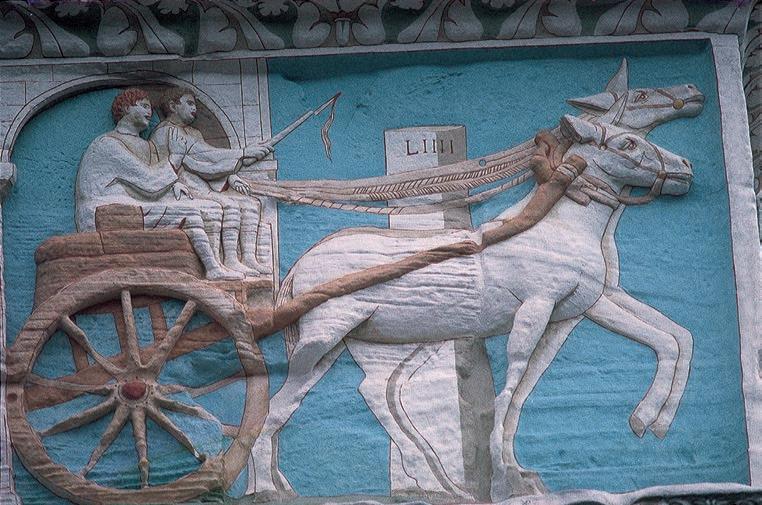
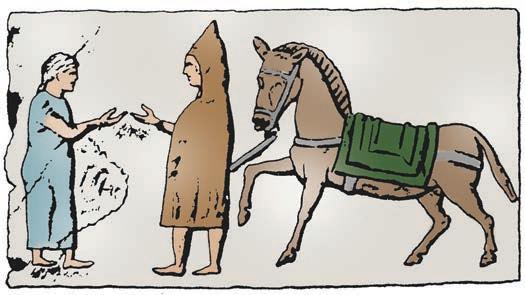
Thinking point: What factors would have affected the journey time of a Roman traveler?
A light carriage with two horses, passing a milestone (a stone used to mark distance along Roman roads).
A copy of a carving found on a tombstone. A traveler in a hooded cloak pays for a meal for himself and his mule.
Letters came and went in all directions across the Roman Empire. Letters written by government officials or containing matters of state could be sent using the Imperial Post (cursus pūblicus). Someone carrying such letters would have a government permit (diplōma) which indicated that they were on official business and therefore entitled to fresh horses at the mānsiōnēs. These were official stopping places with stables, food, and accommodation, found along all main roads.
It has been estimated that an official courier could average 50 miles (80 kilometers) a day. In an emergency, he could triple this distance by traveling night and day. Private letters took much longer. These were either carried by an enslaved person or sent with a trusted traveler, such as a friend or a merchant with a good reputation.

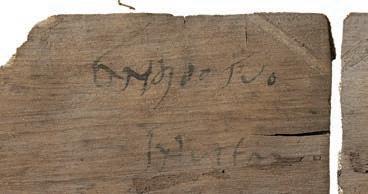
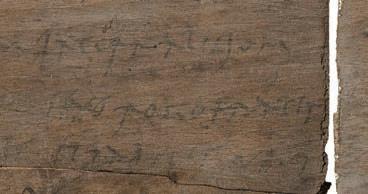

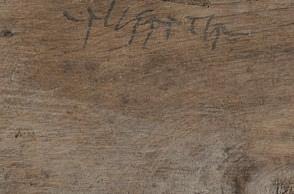
Many letters have been found during the excavations of the Roman fort at Vindolanda on Hadrian’s Wall, including this one sent by Severus to his friend Candidus:
“Severus to his Candidus, greetings. Regarding the . . . for the Saturnalia, I ask you, brother, to see to them at a price of 4 or 6 asses, and radishes costing no less than ½ denarius. Farewell, brother.”
On the back:
“To Candidus, slave of Genialis the prefect, from Severus, slave of . . .”
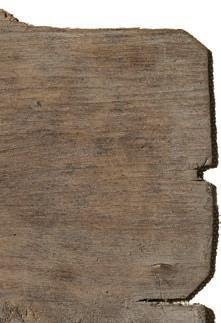
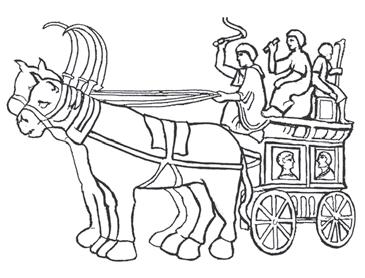
An enclosed coach of the Imperial Post drawn by two mules. There is seating inside and on top
postrīdiē, cum Quīntus et Dumnorix ad ultimās partēs īnsulae contenderent, mīlitēs Dumnorigem per oppidum frūstrā quaerēbant. rem dēnique Salviō nūntiāvērunt. ille, cum dē fugā Dumnorigis cognōvisset, vehementer saeviēbat. tum Quīntum quaesīvit; cum eum quoque nusquam invenīre potuisset, Belimicum, prīncipem Cantiacōrum, arcessīvit.
“Belimice,” inquit, “iste Dumnorix ē manibus meīs effūgit; abest quoque Quīntus Caecilius. neque Dumnorigī neque Quīntō crēdō. ī nunc; dūc mīlitēs tēcum; illōs quaere in omnibus partibus oppidī. quaere comitēs quoque eōrum.”
Belimicus, multīs cum mīlitibus ēgressus, per oppidum dīligenter quaerēbat. intereā Salvius anxius reditum eius exspectābat. cum Salvius rem sēcum cōgitāret, Belimicus subitō rediit exsultāns. pistōrem dēplōrantem in medium ātrium trāxit.
“pistōrem, quī prope vīllam Aventīnae habitat, comprehendī.”
Salvius ad pistōrem conversus,
“ubi est Quīntus Caecilius?” inquit. “quō fūgit Dumnorix?”
“nescio,” inquit pistor quī, tantam iniūriam passus, quicquam dīcere nōlēbat. “nihil scio,” iterum inquit.
Belimicus, cum haec audīvisset, gladium dēstrictum ad iugulum pistōris tenuit.
“melius est tibi,” inquit, “vērum Salviō dīcere. num perīre māvīs?”

fugā: fuga escape nusquam nowhere
ī: īre go reditum: reditus return exsultāns: exsultāre exult, be triumphant
conversus having turned quicquam anything
dēstrictum: dēstring ere draw out
iugulum: iugulus throat māvīs: mālle prefer
pistor, quī iam dē vītā suā dēspērābat,
“cibum quīnque diērum tantum parāvī,” inquit susurrāns.”nihil aliud fēcī. Quīntus Caecilius cum Dumnorige ad ultimās partēs Britanniae festīnat.”
Salvius “hercle!” inquit. “ad Agricolam iērunt. Quīntus, ā Dumnorige incitātus, mihi obstāre temptat; homō tamen magnae stultitiae est; mihi resistere nōn potest, quod auctōritās senātōris nōn minor est quam illius.”
Salvius, cum haec dīxisset, Belimicō mandāta dedit. eum iussit cum trīgintā equitibus exīre et fugitīvōs comprehendere. pistōrem custōdibus trādidit. deinde ūnum ē servīs suīs arcessīvit cui epistulam dictāvit. nūntium iussit hanc epistulam quam celerrimē lēgātō Agricolae ferre.
intereā Belimicus, Quīntum et Dumnorigem per trēs diēs persecūtus, eōs tandem in fundō dēsertō invēnit. equitēs statim impetum in eōs fēcērunt. amīcī, ab equitibus circumventī, fortiter sē dēfendēbant dēnique Dumnorix humī cecidit mortuus. cum equitēs corpus Dumnorigis in puteum altum inicerent, Quīntus, graviter vulnerātus, magnā cum difficultāte per agrōs effūgit.
25
30
35
minor smaller, less impetum: impetus attack corpus body

1 In this Stage, you have met sent ences with cum and the pluperfect subjunctive:
cum rem cōnfēcissent , abiērunt.
When they had finished the job, they went away.
senex, cum pecūniam invēnisset , ad vīllam laetus rediit.
The old man, when he had found the money, returned happily to the villa.
2 Now study the following examples:
cum cus tōdēs dormīrent , fūrēs ē carcere effūgērunt.
When the guards were sleeping , the thieves escaped from the prison.
Aventīna, cum in viā stāret , Belimicum cōnspexit.
Aventina, when she was standing in the street, caught sight of Belimicus.
In these sentences, cum is being used with a different tense of the subjunctive, the imperfect subjunctive
3 Further examples:
a cum hospitēs cēnam cōnsūmerent, fūr cubiculum intrāvit.
b cum prīnceps rem cōgitāret, nūntiī subitō r evēnērunt.
c iuvenēs, cum bēstiās agitārent, mīlitem vulner ātum cōnspexērunt.
d puella, cum epistulam scrīberet, sonitum mīrābilem audīvit
4 Compare the 3rd person of the imperfect subjunctive with the infinitiv e: infinitive imperfect subjunctive singular plural
first conjugation portāre portāret portārent
second conjugation docēre docēret docērent
third conjugation trahere traheret traherent
fourth conjugation audīre audīret audīrent
irregular verbs
esse esset essent velle vellet vellent
cum and the pluperfect subjunctive: page XX

cum plaustrum Aventīnam Vilbiamque per silvam dēnsam lentē veheret, Vilbia amitam dē monumentīs antīquīs, quae fabrī Britannicī iamprīdem posuerant, rogāvit.
“ūnum ex hīs monumentīs nōn procul ab oppidō Aquīs Sūlis situm est,” eī respondit Aventīna. “templum aut aedificium magnificius quam illud nusquam vīdī. neque templa urbis Athēnārum neque pӯramidēs Aegyptiās huic monument sacrō praestant.”
cum Aventīna haec dīxisset, Vilbia sonōs subitō audīvit. ē plaustrō dēscendēns, vestīgia humī cōnspexit. deinde inter arborēs contendit, vestīgia secūta.
“Vilbia! cavē!” clāmāvit Aventīna. “fortasse animal saevum, ā vēnātōribus vulnerātum, sub arboribus latet.”
Vilbia, brevī regressa, amitam vocāvit.
“festīnā hūc!” inquit. “Rōmānum vulnerātum invēnī! moribundus est!”
Aventīna, cum ad Vilbiam accurrisset, attonita, “agnōscō eum!” inquit. “est amīcus Togidubnī, Quīntus Caecilius. ēheu! multum sanguinis ē vulneribus iam efflūxit. Vilbia, eum movēre nōn audeō. fer aquam! eī bibendum est.”
cum Vilbia revēnisset, Quīntus aquam bibit oculōsque paulātim aperuit. suspīrāvit Vilbia commōta.
Aventīna tamen “fer mihi mel!” eī dīxit. “volō tē mihi duo ligāmenta quoque ferre!”
Vilbia amitae statim pāruit. cum Aventīna ligāmenta parāret, Vilbia mel in vulnera Quīntī collocāvit. Quīntus īnfirmus, “es prūdentissima,” inquit. “nihil melius est quam mel.”
tandem Quīntus, ab Aventīnā Vilbiāque optimē cūrātus, ad plaustrum claudicāre potuit. tum Aventīna ad eum conversus, “Dēvam iter facimus,” inquit. “frāter meus ferrārius est Dēvae. apud nōs quiēscere potes.”
Quīntus “Dēvam?” susurrāvit. “ergō spēs manet . . .”
Stonehenge and other Neolithic sites in Britain predate the Roman occupation by thousands of years.
praestant:praestāre be superior to, surpass
vestīgia: vestīgium footprint, track
arborēs: arbor tree brevī in a short time eī bibendum est he must drink
suspīrāvit: suspīrāre sigh, draw breath ligāmenta: ligāmentum bandage
ferrārius blacksmith Dēvae at Chester ergō therefore spēs hope
1 You have already met the following opposites: volō I want nōlō I do not want scio I know nescio I do not know
2 Study these opposites and work out the meanings that are missing: homō person nēmō ōtium leisure negōtium umquam ever numquam .
usquam anywhere nusquam
3 Study these further ways o f forming opposites and work out the meanings that are missing: patiēns patient impatiēns mortālis mortal immortālis .
ūtilis useful inūtilis nocēns guilty innocēns nōtus, -a well-known ignōtus cōnsentīre to agree dissentīre persuādēre to persuade dissuādēre
facilis easy difficilis
4 From the box choose the correct L atin words to translate the words in bold in the following sentences: certa fēlīx similis inimīcus dissimilis incerta amīcus īnfēlīx
a A black cat was thought to be lucky , but a stumble was unlucky b Catia was uncertain whether she was in danger.
c Dumnorix is the friend of Quintus, but Belimicus is his enemy . d Vilbia is like Aventina in char acter, but different in age.
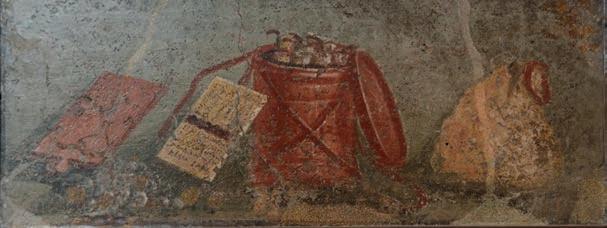
Vitellianus arrives unexpectedly at the palace, and he has not come alone.
cum sōl lūcēret, Catia et Rūfilla in hortō Togidubnī garriēbant, inter flōrēs variōs ambulantēs.
“aliquid novī dē marītō tuō audīvistī?” Catiam rogāvit Rūfilla. “valēscetne?”
Catia eī respondit, “epistulam, ā rēg e dictātam, nūper accēpī. morbus paulō minus gravis est.”
“quam fēlīx es!” inquit Rūfilla. “nihil dē meō marītō audīvī.”
“et quid dīcit Vitelliānus?”
“Salvius est nimis occupātus.”
cum Rūfilla haec dīxisset, Vitelliānus ipse, hortum ingressus, ad duās fēminās adiit. manum quattuor mīlitum dūcēbat.
“quid facis, mī fīlī?” rogāvit mātrōna attonita. “cūr adsunt mīlitēs? nōn decōrum est tibi . . .”
“nōn decōrum est mihi iussa patris negleger e,” eī dīxit Vitelliānus. “ille iussit mē rēgīnam in hāc aulā retinēre. Togidubnus perfidus, in oppidō Aquīs Sūlis comprehēnsus, iam in carcere iacet.”
“num vērum dīcis?” inquit Rūfilla. “quanta es t īnsānia marītī meī?”
Catia tamen, quae adhūc tacuerat, ad Rūfillam sē vertit atque “valē, amīca” placidē dīxit. vultus eius erat serēnus. tum mīlitēs, ad rēgīnam prōgressī, eam intrā aulam dūxērunt.
1 Explore the story
a Look at lines X–X.
i What were Catia and Rufilla doing in Togidubnus’ garden?
ii What was the weather like while they were there?
b Lines X–X: what two questions did Rufil la ask Catia?
c Lines X–X: what has Togidubnus told Ca tia in a letter?
d Look at lines X–X.
i What has Rufilla heard from Salvius?
ii What has Vitellianus told Rufilla about Salvius?
e Lines X–XX: what happened after Rufil la had spoken?
f Look at lines XX–XX.
i What had Vitellianus done to make his mother a ttonita ?
ii What two questions did Rufilla ask her son?
minus less nimis too iussa: iussum order, instruction neglegere ignore, disregard quanta? how great? īnsānia madness, insanity placidē calmly intrā inside, within 5 10 15
g Line XX: what did Vitellianus say about his father’s instructions?
h Look at lines XX–XX.
i What has Salvius ordered Vitellianus to do?
ii What has happened to Togidubnus?
iii How is Togidubnus described by Vitellianus?
i Line XX: what did Rufilla say in response to what Vitellianus had said?
j Look at lines XX–XX.
i What had Catia been doing until this point?
ii How did Catia seem when she spoke to Rufilla?
iii How is Catia’s appearance described?
iv What happened to Catia at the end of the story?
2 Explore the language
Speech can tell us about a character’s personality and feelings. Catia, Rufilla, and Vitellianus all have very different ways of speaking. This includes how often they ask questions, whether they use long or short sentences, and the types of words they use. Look closely at what each of these characters says and how they say it. What can you learn about them from this?
3 Explore further
A single event might be interpreted very differently by various people observing it. Think about Catia’s actions at the end of the story and the possible reasons why she behaved in this way.
How do you think that Vitellianus interpreted these actions? What about Rufilla? What factors might affect their interpretations? How do you interpret Catia’s actions?
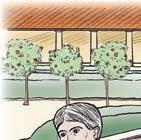
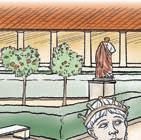
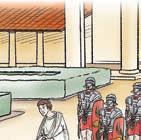
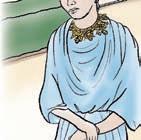
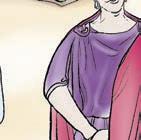

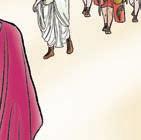


Reviewing the language Stage 24: page XXX
What do the life and career of Agricola reveal about how the Romans governed their empire?
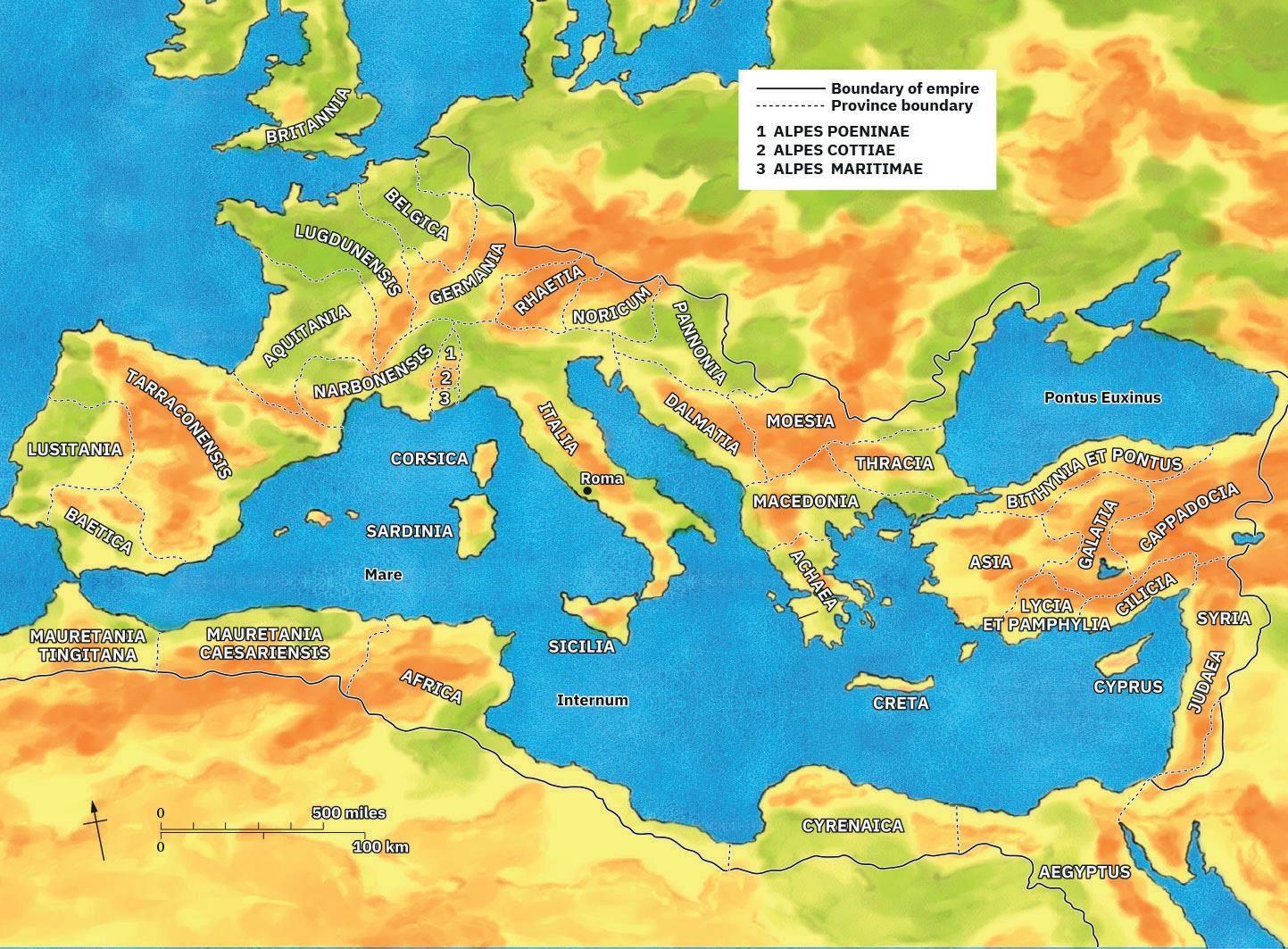
The provinces of the Roman Empire at its greatest extent, during the reign of Emperor Trajan.
Thinking point 1: Look at the map of the Roman Empire. What might be the challenges of governing this territory?
The Romans conquered their empire gradually over several centuries, starting with the island of Sicily in the third century BC and ending in the late first and early second centuries AD with Trajan’s conquests in Dacia (modern Romania) and the east. Some provinces, such as Britannia, became part of the empire as a result of military invasion. Others were acquired by other means: Bithynia, for example, was left to Rome in the will of King Nicomedes IV in return for support from the Romans in his struggle for the throne. However they were obtained, once provinces were part of the empire the Romans aimed to govern them for the benefit of Rome and the emperor. Provinces were run by governors appointed by the emperor and Senate (the main governing and advisory body in Rome). Governors were the ultimate authorities in their province. In our story, Quintus and Dumnorix decide to consult Britannia’s governor, Agricola, about Salvius’ actions. Governing a province was a difficult task and Roman politics was full of intrigue. Agricola may have outranked him, but men like Salvius could amass a great deal of power and influence; they were useful allies and dangerous enemies.
Most provinces are “senatorial provinces” and their governors are appointed by the Senate for one year. Some, such as Egypt and Britannia, are “imperial provinces”, with governors chosen personally by the emperor. In the case of Egypt, no senator can even visit without the emperor’s permission. Imperial provinces are often more dangerous, and their governors usually serve three years. I work with Gnaeus Julius Agricola, who was made governor of Britannia by Emperor Vespasian. Britannia is a relatively new, not very peaceful province on the edge of the empire; so it requires a permanent military presence and strong military leadership.
Men who are appointed as governors have always had distinguished careers in which they held important of ces. The Senate and the emperor take care to select suitable people for such important jobs, keeping a lookout for men who show special skill or talent during the earlier part of their career.
Thinking point 2: Most governors were appointed for one year. Why do you think governors were appointed for three years in imperial provinces?
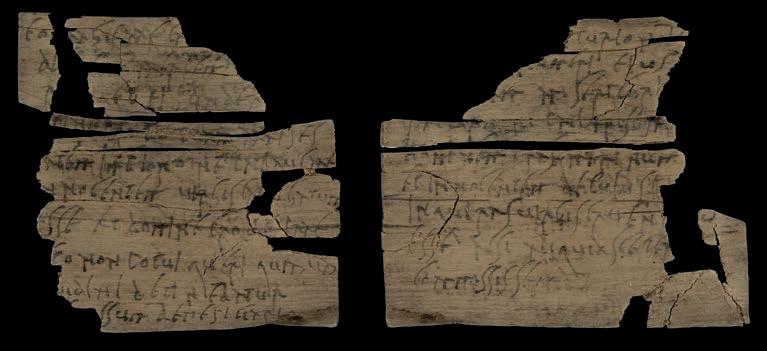

In this letter from Vindolanda, a man (probably a trader) appeals to the provincial governor to stop his violent and unjust punishment at the hands of the military. He says that he has tried complaining to the officers with no success, and that the local commander cannot hear his case due to ill health. The governor is, therefore, his last hope for justice.
Aspirational Roman politicians like Agricola had to work their way up a set sequence of military and administrative offices. In AD 64 Agricola was appointed quaestor in Asia; he served as tribune of the people in AD 66 and was made praetor in AD 68.

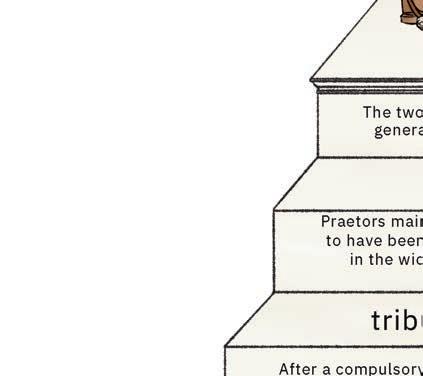

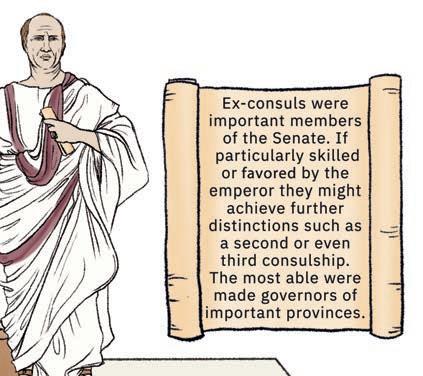
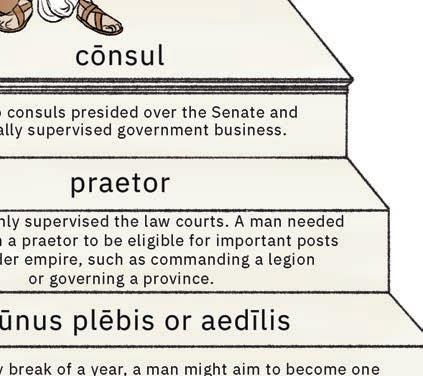
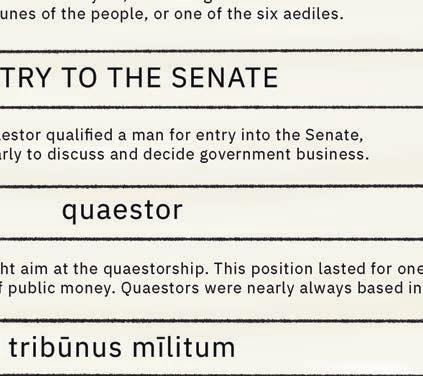



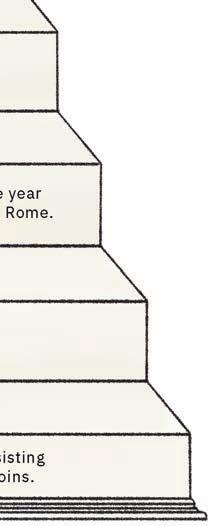
Our main source regarding Agricola’s life is the biography written by Agricola’s son-in-law, the historian Tacitus. He tells us that Agricola was born in southeast Gaul in AD 40. His father had been made a senator by Emperor Tiberius, but later fell out of favor with Emperor Gaius Caligula and was executed shortly after Agricola was born.
Agricola went to school in Massilia (Marseilles), which was the cultural and educational center of southern Gaul. He followed the normal curriculum for the young sons of upper-class Roman families, including public speaking and philosophy.
Thinking point 3: You learned about Roman education in Unit 1, Stage 10. As well as public speaking and philosophy, what else might Agricola have studied? How might this education have helped him during his career?
“I remember that Agricola often told us that when he was young, he was more enthusiastic about philosophy than a Roman senator was expected to be, and his mother thought it wise to restrain such a passionate interest.”
(Tacitus, Agricola 4)
At the age of 18, Agricola served in the Roman army in Britain as a military tribūnus (a high-ranking officer) under Suetonius Paulinus, governor of Britannia from AD 59 to 61.
“Agricola was not careless like those young men who treat soldiering as a game. Neither was he lazy, he never used his tribune’s rank or his inexperience as a reason to escape from duty and enjoy himself. Instead, he tried to learn about the province and got to know the men in the army. . . .
Britain had never been more troubled, or in a more critical condition. Veteran soldiers had been massacred, colonies burned, and armies cut off from their bases. One moment might bring victory, the next a ght for survival. Although all this happened under someone else’s leadership (the glory of winning back the province belonged to the general who was in command), the young of cer still gained skill, experience, and ambition.”
(Tacitus, Agricola 5)
Thinking point 4: Tacitus describes Britannia as in “critical condition” during the governorship of Suetonius Paulinus. What rebellion was responsible for the burning of colonies and massacre of soldiers mentioned by Tacitus?
Agricola returned to Rome to continue his political career and in the civil war of AD 69 took the side of the future Emperor Vespasian. In AD 70, he returned to Britain to take command of the undisciplined and troublesome Twentieth Legion, stationed at Viroconium (Wroxeter) in the west of England.
Thinking point 5: According to Tacitus, what was Agricola like as a young man and early in his career?









“At that time Vettius Bolanus was governor of Britannia. He was too gentle a ruler for such an unstable province. Under his leadership, Agricola restrained his own energy and enthusiasm, as he had been trained to obey his superiors and think about practicalities as well as glory. A short time later, Petilius Cerealis was appointed governor and Agricola had more opportunities to show his skills. . . . To test his abilities, Cerealis frequently entrusted Agricola with part of his army, and due to his success, sometimes enlarged the forces under his command.”
(Tacitus, Agricola 8)
Thinking point 6: What is Tacitus’ opinion of Vettius Bolanus as governor of Britannia? How does he portray Agricola’s experience of working with him and then with Petilius Cerealis?
Agricola’s success in handling this command was rewarded by promotion to the governorship of Aquitania (the central region in modern France) in Gaul. He then became consul in Rome and in AD 78 returned to Britain for a third time, this time as prōpraetor (governor) of the province.
Thinking point 7: What experience and qualities did Agricola have that would have made him seem a good choice as governor of Britannia?
A governor appointed by the emperor was normally given instructions or mandāta regarding the work he was to do in the province. By the reign of Emperor Vespasian, the Romans considered their control of the southeast of Britain to be reasonably secure, so the mandata given to governors of Britannia appointed by Vespasian included expanding control into modern Wales and the north of the island.
A governor’s rst and most important duty is a military one: to protect his province against attack from outside and rebellion from inside, using the troops under his command. He might, like Agricola, use these troops to conquer further territory, but he can also use them, if necessary, to deal with problems such as bandits or pirates. A small number of soldiers serve as of cials on the governor’s staff, but soldiers should not otherwise be used for jobs that can be done by ordinary people.



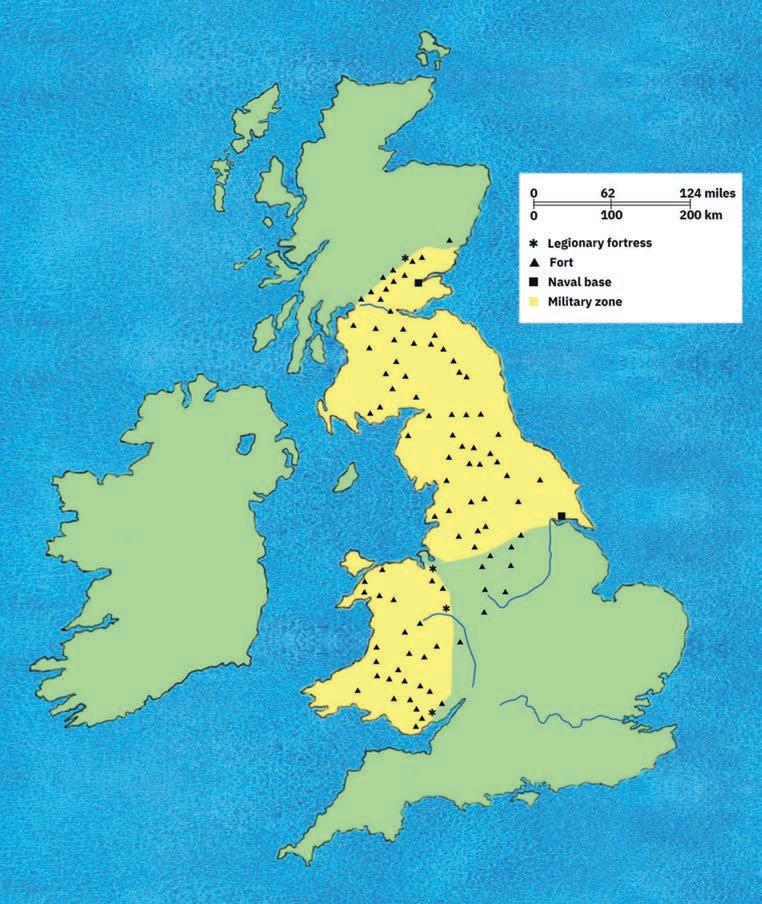
Britain between AD 70 and 85.
Agricola was the third governor of Britannia appointed by Vespasian. He completed the conquest of what is now Wales and then fought a series of successful campaigns in modern Scotland, culminating in his victory at Mons Graupius in the north of the Grampian mountains. He extended the network of roads and forts across the north of Britannia and established the legionary fortress at Chester.
“Experts remarked that no general had ever shown greater skill in the choice of good sites than Agricola; none of his forts were destroyed by storms or surrendered to the enemy. Troops could march out frequently because they had enough supplies to survive a twelve-month siege . . . each garrison could defend itself and the enemy were helpless and driven to despair.”
(Tacitus, Agricola 22)
Thinking point 8: How does this map support the claim that the Romans considered their control of the southeast to be secure?




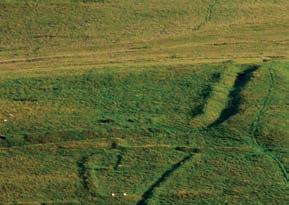
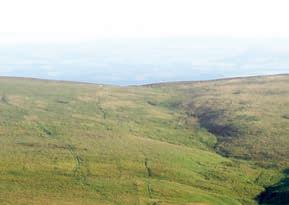




The earthworks of Chew Green in Northumberland, one of the camps built by Agricola on his way to try to conquer the Caledonians of Scotland.

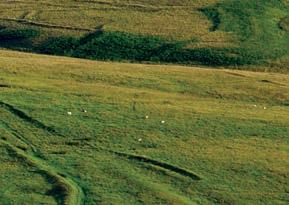




In addition to military duties, the governor also had an important role in the provincial justice system. As the empire grew and became more complicated to run, however, this combination of military and administrative duties became more difficult to handle. Emperor Vespasian therefore created a new post, the lēgātus iūridicus
Governors are expected to travel around their province and act as judge in the towns’ law courts. As well as appeals, all cases involving the death penalty or large sums of money have to be heard by the governor. Sometimes, governors like Agricola are too busy with military tasks to administer the law. When this happens, the emperor can send out another of cial to handle the law courts. This is the position I hold in Britannia; I act as legatus iuridicus in the south while Agricola is busy campaigning in the north.
Thinking point 9: Explain the role of the legatus iuridicus. Why might a governor like Agricola have benefited from the support of a man in this position?
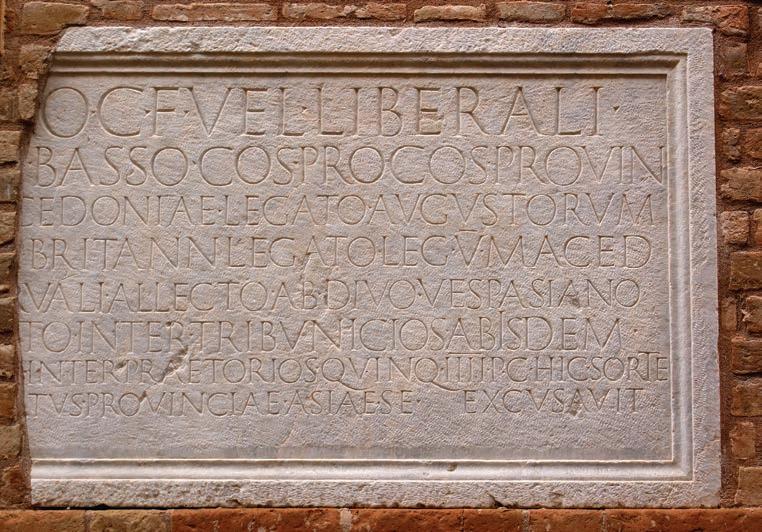

Salvius held an important priesthood as one of the twelve Arval Brothers. The records of the Arval Brotherhood show long periods in which Salvius did not attend meetings, implying that he was not in Rome. Historians infer that some of these absences are due to Salvius being posted to the provinces. It is suggested that Salvius was sent as iuridicusto Britain around AD 80 during the governorship of Agricola. He clearly had a close relationship with several emperors. As a reward for his services, he received the consulship from Emperor Domitian. Tacitus records that Agricola tried to introduce the Britons to the Roman way of life, encouraging the building of temples, fora, and houses in the Roman style.
He also apparently arranged for the sons of British chiefs to receive a Roman education. Tacitus also claims that Agricola took great care to rule fairly, putting a stop to corruption and abuses in tax collection. His aim, so Tacitus claims, was to convince the Britons that it was better to live peacefully and obey the Romans than to rebel against them.
“[Agricola] had learned from others’ experience that little is gained by conquest if it is followed by injustice.
. . . he made peace shine brightly when the indifference or arrogance of previous governors had made it seem just as dreadful as war.”
(Tacitus, Agricola 19–20)
Agricola was governor of Britannia for seven years, an unusual length of time and longer than any other imperial Roman governor. During this time the area under direct Roman control nearly doubled. Agricola was recalled from Britain in AD 85. Tacitus says this was because of the jealousy of Domitian; however, Tacitus often tries to make Domitian appear paranoid and cruel. His portrayal of Agricola might be seen as a way to highlight the shortcomings of the emperor who recalled him.
When he returned to Rome, Agricola was given the honors due to a successful general, but this was the end of his career. He retired and held no other public offices until his death in AD 93.
Thinking point 10: How much longer was Agricola’s term of office than that usually served by imperial governors? Why do you think he was governor of Britannia for such a long time?
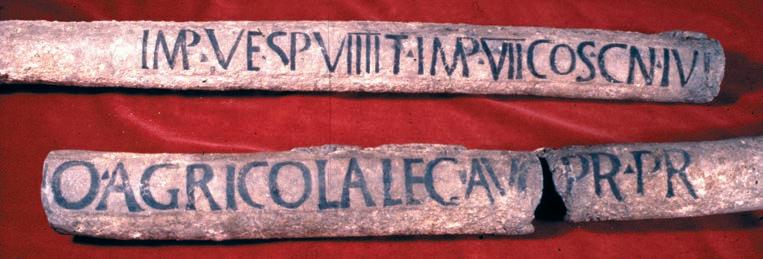
A lead water pipe (above) found at Chester. The inscription tells us that the pipe was made when Vespasian and Titus were consuls and Agricola was governor of Britannia (AD 79). Agricola’s name also appears in an inscription (below) from the basilica of the forum in Verulamium (St. Albans), but only fragments of this survive. These two references might have been almost all we knew about Agricola, if Tacitus had not written his biography.



Thinking point 11: Summarize the evidence that we have about Agricola’s governorship of Britannia. How useful are the different sources for finding out about his governorship?
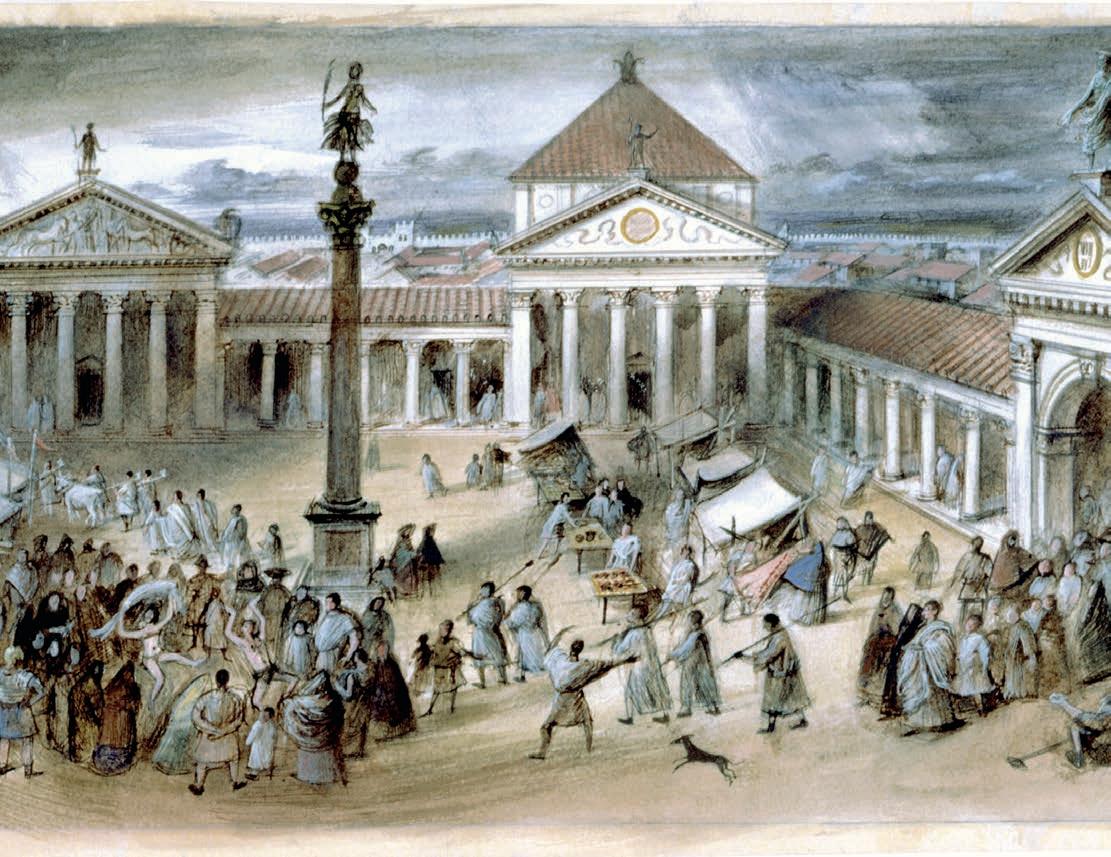
Agricola encouraged the building of Roman-style fora in Britannia’s towns; this is an artist’s impression of the one built in Verulamium (St. Albans) in c.AD 79. Fora like this would have been important for local government and administration.
What do the life and career of Agricola reveal about how the Romans governed their empire?
You may wish to consider the following:
• types of provincial governor and their roles
• the nature of Britannia as a Roman province
• Agricola’s background and status
• his career before he became governor
• his actions as governor of Britannia
• how typical Agricola and Britannia were as a governor and province
• issues arising from the nature of available evidence about Agricola.
arcessō, arcessere, arcessīvī, arcessītus
summon, send for auctōritās, auctōritā tis, f. authority carcer, carc eris, m. prison comes, comitis, m.f. comrade, companion compr ehendō, comprehendere, comprehendī, comprehēnsus arrest, seize cum when dēscendō, dēscendere, dēsc endī come down, go down humī on the ground intereā meanwhile minor, gen. minōris smaller, less moveō, movēre, mōvī, mōtus move neque . . . neque neither nor passus, passa , passum having suffered r etineō, retinēre, retinuī, retentus
hold back, keep (back) saevus, saeva, saevum savage, cruel secūtus, secūta, secūtum having followed sub under, beneath ultimus, ultima, ul timum final, last, furthest vērum, vērī, n. the truth, truth vultus, vultūs, m. expression, face
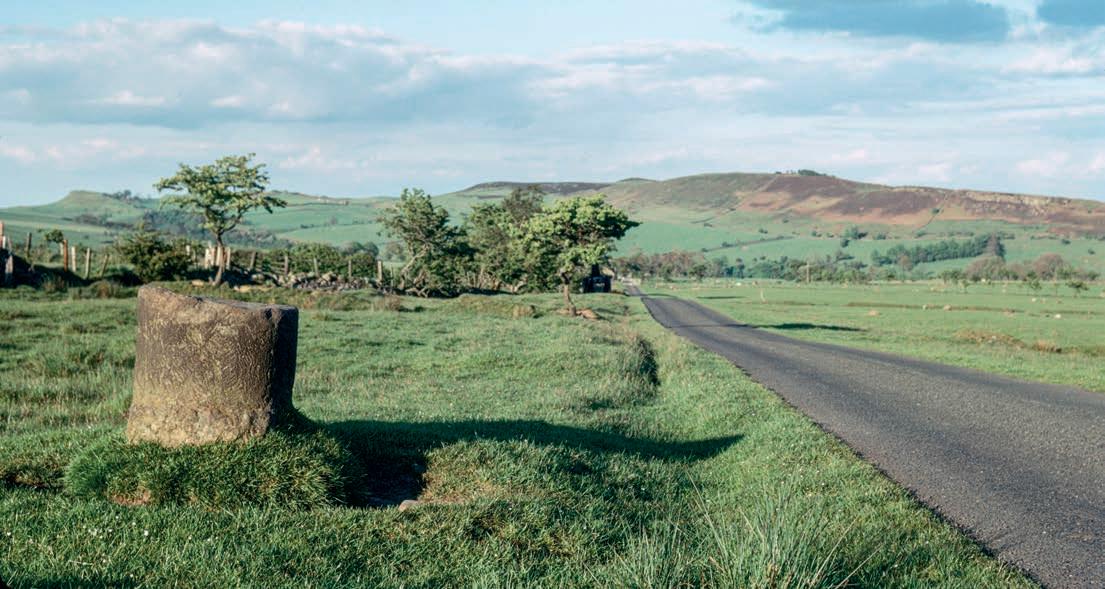
Good roads were crucial for Roman control of the provinces. This modern road follows the course of the Stanegate, thought to have been built under Agricola’s governorship to link Corstopitum (Corbridge) in the east and Luguvalium (Carlisle) in the west. The stone on the left is the remains of a Roman milestone.



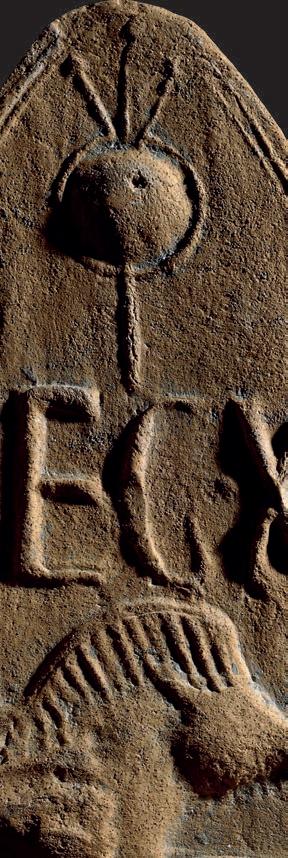
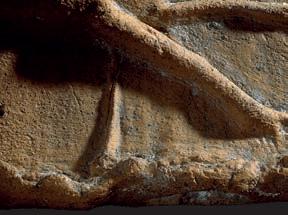


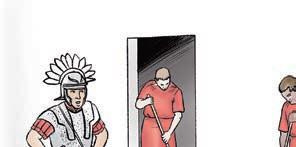


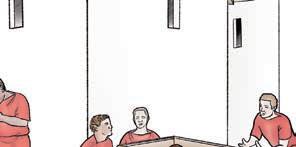
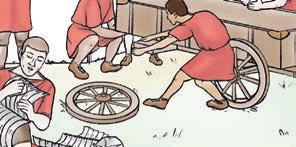


mīlitēs legiōnis secundae, quī Dēvae in castrīs erant, diū et dīligenter labōrābant. nam lēgātus legiōnis adventum virī clārī exspectābat. mīlitēs, ā centuriōnibus iussī, multa et varia faciēbant: aliī arma poliēbant; aliī aedificia pūrgābant; aliī plaustra reficiēbant.
post trēs diēs lēgātus mīlitibus adventum Agricolae nūntiāvit. mīlitēs, cum hoc audīvissent, maximē gaudēbant quod Agricolam dīligēbant.
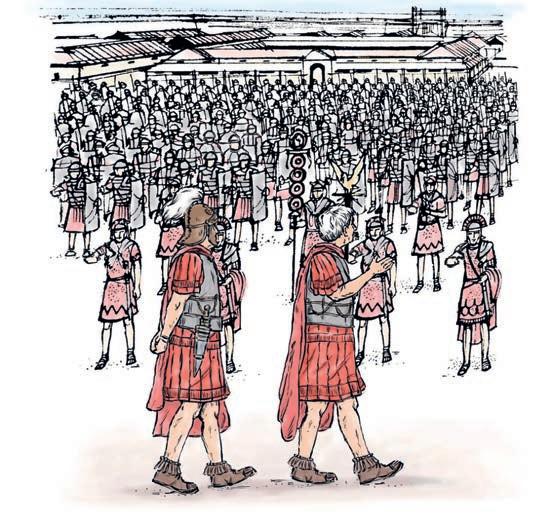
1 tertia hōra erat. lēgātus sibi dīxit, “mīlitibus decōrum est Agricolam salūtāre.” itaque mīlitēs in ōrdinēs longōs īnstrūxit ut Agricolam salūtārent. mīlitēs, cum Agricolam castra intrantem vīdissent, magnum clāmōrem sustulērunt: “iō, Agricola! iō, iō, Agricola!”
Original material © University of Cambridge School Classics Project 2025. This material is not final and is subject to further changes prior to publication.
2 Agricola, ā mīlitibus ita salūtātus, ad lēgātum sē vertit.
“prīmō mīlitibus pauca verba dīcere volō,” inquit. tum Agricola tribūnal cōnscendit ut mīlitibus pauca dīceret.
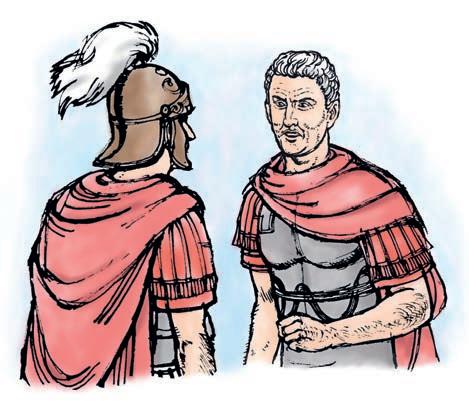
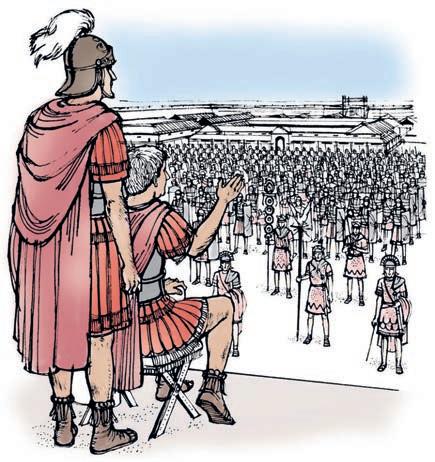
4 posteā Agricola, ad lēgātum conversus, “nunc mīlitēs īnspicere volō,” inquit. “dūc mē tēcum per ōrdinēs.” Agricola per ōrdinēs ita prōcessit ut mīlitēs īnspiceret.
3 dum Agricola cōnsīdit, lēgātus silentium postulāvit. “tacēte vōs omnēs!” clāmāvit. “tacēte vōs, sī Agricolam audīre vultis!” omnēs statim tacuērunt ut Agricolam audīrent. Agricola “gaudeō,” inquit, “quod hodiē vōs rūrsus videō. nūllam legiōnem fidēliōrem habeō, nūllam fortiōrem. virtūtem vestram magnopere laudō.”
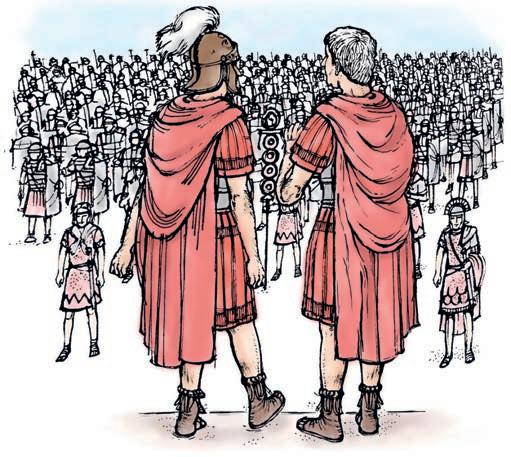
Once you have read this story, answer the questions at the end. Agricola, cum mīlitēs legiōnis secundae īnspexisset, ad prīncipia prōcessit ut sermōnem cum lēgātō habēret.
Salvius ipse paulō prius ad castra advēnerat. iam in prīncipiīs sedēbat, adventum Agricolae anxius exspectāns. sollicitus erat quod in epistulā, quam ad Agricolam mīserat, multa falsa scrīpserat. in prīmīs Togidubnum sēditiōnis accūsāverat. in animō volvēbat num Agricola sibi crēditūrus esset. Belimicum sēcum dūxerat ut testis esset.
subitō Salvius, Agricolam intrantem cōnspicātus, ad eum festīnāvit ut salūtāret. deinde commemorāvit ea quae in epistulā scrīpserat. Agricola, cum haec audīvisset, diū tacuit. dēnique maximē commōtus, “quanta perfidia!” inquit. “quanta īnsānia! id quod mihi patefēcistī, vix intellegere possum. īnsānīvit rēx. īnsānīvērunt prīncipēs Rēgnēnsium. numquam barbarīs crēdere dēbēmus; semper nōs prōdunt.”
haec locūtus, ad lēgātum legiōnis sē vertit.
“necesse est nōbīs rēgem prīncipēsque Rēgnēnsium quam celerrimē opprimere. ī nunc; tibi statim cum duābus cohortibus proficīscendum est.” lēgātus, ē prīncipiīs ēgressus, centuriōnibus mandāta dedit. dum eōs iubet cohortēs parāre, Agricola plūra dē rēgis perfidiā rogāre coepit. Salvius eī respondit,
“ecce Belimicus, vir ingeniī optimī summaeque fideī, quem iste Togidubnus corrumpere temptābat. Belimicus autem, quī blanditiās rēgis spernēbat, omnia mihi patefēcit.”
“id quod Salvius dīxit vērum est,” inquit Belimicus. “rēx Rōmānōs ōdit. Rōmānōs ē Britanniā expellere tōtamque īnsulam occupāre cupit. nāvēs igitur comparat. mīlitēs exercet. etiam bēstiās saevās colligit Togidubnus. nūper bēstiam in mē impulit ut mē interficeret.”
Agricola tamen, hīs verbīs diffīsus, Salvium dīligentius rogāvit quae indicia sēditiōnis vīdisset. cognōscere voluit quot essent mīlitēs, num Britannī cīvēs Rōmānōs interfēcissent, quās urbēs dēlēvissent.
fuit subitō clāmor imprōvīsus. per iānuam prīncipiōrum perrūpit homō claudicāns. quī ad Agricolam magnā cum difficultāte praeceps cucurrit genibusque eius haesit.
“cīvis Rōmānus sum,” inquit. “Quīntum Caecilium Iūcundum mē vocant. multās iniūriās passus, hūc tandem advēnī. hoc ūnum dīcere volō. Togidubnus est innocēns.” haec locūtus, ad pedēs Agricolae prōcubuit exanimātus.
prīncipia headquarters
prius earlier falsa: falsum lie, untruth in prīmīs in particular sēditiōnis: sēditiō rebellion in animō volvēba t: in animō volvere wonder, turn over in the mind num whether crēditūrus going to believe prōdunt: prōder e betray
opprimere crush tibi ... profiscīscendum est you must set out cohortibus: cohors cohort
corrumpere corrupt blanditiās: blanditiae flattery spernēbat: spernere despise, reject diffīsus having distrusted indicia: indicium sign, evidence quot how many imprōvīsus unexpected, unforeseen perrūpit: perrumpere burst through, burst in haesit: haer ēre cling
1 Look at lines X–X.
a Why was Salvius in the headquarters?
b Why is Salvius described as sollicitus ?
c What accusation had Salvius previously made?
2 Line 7: why had Salvius brought Belimicus with him?
3 Lines 9–10: why do you think that Agricola did not reply immedia tely to what Salvius had said?
4 Lines 11–13: do these words tell us that Agricola belie ved what Salvius was telling him, or not? Give a reason for your answer.
5 Look at lines XX–XX.
a What did Agricola tell the legionary commander tha t they must do?
b What instructions did Agricola give the legionary commander?
6 Lines XX–XX: what did Agricola try t o find out?
7 Look at lines XX–XX.
a How did Salvius describe Belimicus’ character?
b What did Salvius say that Belimicus had done to help him?
8 Lines XX–XX: from the information giv en by Belimicus, choose one detail that Agricola might have believed and one thing about which he might have had doubts. Explain your choices.
9 Lines XX–XX: what three things did Agricola want to find out about the rebellion Salvius was accusing Togidubnus of making?
10 Lines XX–XX: what caused the unforeseen upr oar?
11 Lines XX–XX: what two things did the newly arrived man do?
12 Lines XX–XX: which three Latin w ords from these lines explain what happened in line XX–XX ( ad pedēs Agricolae prōcubuit exanimātus )?
1 Study the following examples:
mīlitēs ad prīncipia convēnērunt ut Agricolam audīrent .
The soldiers gathered at the headquarters in order that they might hear Agricola . per tōtam noctem labōrābat medicus ut vulnera mīlitum sānāret
The doctor worked all night in order that he might treat the soldiers’ wounds
The groups of words in bold are known as purpose clauses , because they indicate the purpose for which an action was done. The verb in a purpose clause in Latin is always subjunctive.
2 Further examples:
a omnēs cīvēs ad forum contendērunt ut senāt ōrem spectārent.
b Catia stilum et cērās postulāvit ut epistulam scrīberet.
c dēnique ego ad patrem rediī ut rem explicārem.
d rēx iter ad fontem f ēcit ut auxilium quaereret.
e equōs celeriter cōnscendimus ut ex oppidō fug erēmus.
f vīllam intrāvistī ut pecūniam nostr am caperēs.
3 Instead of translating ut and the subjunctive as in order that I (you, etc.) might ., it is often possible t o use a simpler form of words: mīlitēs ad prīncipia convēnērunt ut Agricolam audīrent.
The soldiers gathered at the headquarters in order to hear Agricola. Or, simpler still:
The soldiers gathered at the headquarters to hear Agricola.
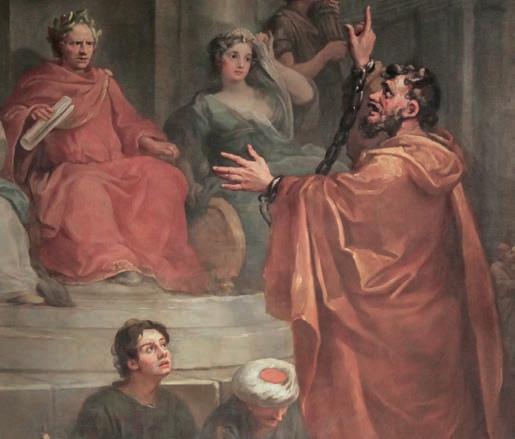
imperfect and pluperfect subjunctive: page XXX
Being a Roman citizen (or not) often affected how you were treated. When Paul (later a Christian saint) was arrested by Roman soldiers in Jerusalem, he was bound and almost whipped before he declared “cīvis Rōmānus sum ”. The Roman commander was very worried about the possibility of mistreating a citizen. Therefore when tensions escalated, he chose to send Paul to present his case to his superior, the governor of Judaea.
Agricola, priusquam Salvius aut Belimicus respōnsum daret, custōdēs iussit Quīntum auferre medicumque arcessere. tum ad tribūnum mīlitum, quī adstābat, sē vertit.
“mī Rūfe,” inquit, “propter prūdentiam tuam optimus es omnium tribūnōrum quōs habeō. tē iubeō hunc hominem summā cum cūrā interrogāre.”
Salvius, cum Rūfus exiisset, valdē commōtus,
“omnia explicāre possum,” inquit. “nōtus est mihi hic homō Pompēiānus. nūper in vīllā mē vīsitāvit, quamquam nōn invītāveram. porrō, nesciēbam quālis esset gēns eius. per tōtam hiemem apud mē mānsit, opēs meās dēvorāns. duōs tripodas argenteōs habēbam, quōs abstulit ut Togidubnō daret. sed eum nōn accūsāvī, quod hospes erat. ubi tamen ad oppidum Aquās Sūlis mēcum advēnit, scelus pessimum committere temptāvit. venēnum parāvit ut Memorem, haruspicem Rōmānum, necāret. postquam rem nōn effēcit, mē ipsum accūsāvit. nōlī eī crēdere. multō perfidior est quam Britannī. omnēs Pompēiānī sunt mendācēs. nōnne cōnsentīs?”
haec cum audīvisset, Agricola tantum respondit, “sī haec fēcit, eī moriendum est.”
tum Agricola Salviusque in silentiō exspectābant dum redīret Rūfus. tandem revēnit tribūnus valdē attonitus.
“Quīntus Caecilius,” inquit, “est iuvenis summae fideī et virtūtis. patrem meum, quem Alexandrīae relīquī, bene nōverat. hoc prō certō habeō quod Quīntus hanc epistulam mihi ostendit, ā patre ipsō scrīptam. iter longum et perīculōsum fēcit dum mē invenīret.”
priusquam Salvius quicquam dīcere posset, Agricola Quīntum ad sē vocāvit, cēterōsque dīmīsit. Salvius, Quīntum dētestātus, anxius exiit. Agricola cum Quīntō sermōnem longissimum habēbat.
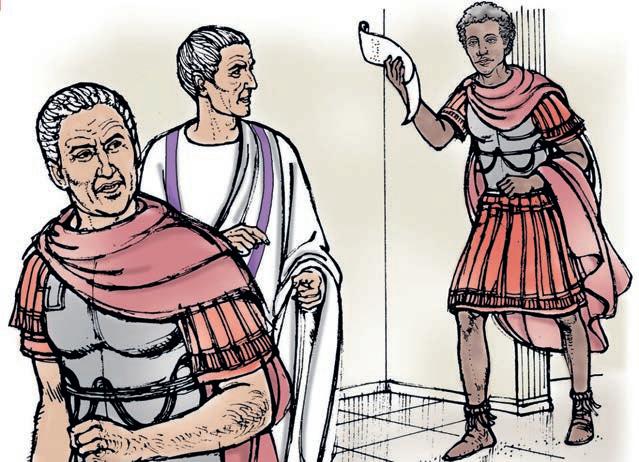
priusquam before adstābat: adstār e stand in attendance pr opter on account of, because of interrogāre question gēns family opēs money, wealth dēvorāns: dēvorāre devour, eat up
multō perfidior much more treacherous dum until
Alexandrīae at Alexandria prō cert ō habeō: prō certō habēre know for certain
dēt estātus having cursed
The officer who commanded a legion was called a legatus. He would have been a member of the Senate in Rome and usually in his mid-thirties. The legatus was assisted by six military tribunes (for a diagram of the hierarchy of a Roman legion, see page XXX). Of these tribunes, one was usually a young man of noble birth, serving in the military before starting a political career. After holding civilian posts in Rome or one of the provinces, such a man might be appointed as legatus himself and spend three or four years commanding his legion. He would then usually resume his civilian career (for the stages of a Roman political career, see page XX).
The other five tribunes were usually also in their thirties and members of a slightly lower social class. They were generally able, wealthy, and educated men, often aiming at important posts in the imperial administration. Some of them returned to the army later to command auxiliary cavalry units. The senior officers usually spent only short periods in the army, unlike the centurions and the legionaries, who served for the whole of their working lives. The officers therefore relied heavily on the advice and expertise of the experienced centurions. The army was highly trained and well organized, so the appointment of relatively inexperienced officers rarely affected the success of its operations.
Some officers, such as Agricola, proved themselves to be extremely capable and were promoted to become governors of provinces such as Britannia where military skill and strong leadership were required.
1 From Stage 14 on, you have met sentences of this kind: necesse est mihi ad castra contendere. necesse est vōbīs labōrāre. I must hurry to the camp. You must work.
2 You have now met another way of expressing the same idea: necesse est nōbīs currere. necesse est eī revenīre. nōbīs currendum est. eī reveniendum est. We must run. She must come back. The word in bold is known as the gerundive





3 Further examples:
a mihi fugiendum est. b nōbīs ambulandum est.
c tibi hīc manendum est. d eī inten t e audiendum est. e omnibus cīvibus tacendum est quod sacerdōtēs appropinquant. f sī imperātōrem vidēre volunt, eīs festīnandum est.







The god Mars, wearing the helmet, breastplate, and greaves of a senior officer.
Thinking point: Think back to Stage 24. When and where did Agricola serve as a military tribune? Which of the two sorts of tribune was he?
Agricola, cum Quīntum audīvisset, Salvium furēns arcessīvit. immōtus in sellā sedēbat dum Salvius advenīret. quī, simulatque intrāvit, aliquid dīcere coepit. Agricola tamen, cum silentium iussisset, surrēxit ut Salvium vehementer accūsāret.
“dī immortālēs! Togidubnus est innocēns, tū perfidus. Quīntus Caecilius, ā tē maledictus, mihi patefēcit quid accidisset. multa eum rogāvī ut vērum cognōscerem. cūr tam īnsānus eram ut tibi crēderem? simulatque ad hanc prōvinciam vēnistī, amīcī mē dē calliditāte tuā monuērunt. nunc rēs ipsa mē docuit. num imperātor Domitiānus hanc tantam perfidiam ferre potest? ego sānē nōn possum. in hāc prōvinciā summam potestātem habeō. iubeō tē hās inimīcitiās dēpōnere. iubeō tē ad Togidubnī aulam īre, veniamque ab eō petere. praetereā imperātōrī ipsī rem explicāre dēbēs.”
haec ubi dīxit Agricola, Salvius īrātus, “quam caecus es!” clāmāvit. “quam longē errās! nōnne rem intellegis?”
sed priusquam Agricola eī respondēret, Salvius
“tū ipse imperātōrī Domitiānō id quod in Britanniā facis explicāre dēbēs,” inquit. “tū enim in ultimīs Britanniae partibus bellum geris et victōriās inānēs ē Calēdoniā refers; sed imperātor pecūniam opēsque accipere cupit. itaque rēgnum Togidubnī occupāre cōnstituit; Calēdoniam nōn cūrat. tū sānē hoc nescīs. in magnō perīculō es, sī cōnsilium meum spernis. nōn sōlum mihi sed etiam imperātōrī ipsī obstās.”
cum hanc contentiōnem inter sē habērent, subitō nūntius prīncipia ingressus exclāmāvit, “mortuus est Togidubnus!”

maledictus: maledīcere insult, slander
prōvinciam: prōvinciam province
inimīcitiās: inimīcitia feud, quarrel
victōriās: victōria victory inānēs: inānis empty, meaningless
Calēdoniā: Calēdonia Scotland cōnstituit: cōnstituer e decide
1 From Stage 24 on, you have met sentences with cum and the imperfect subjunctive. cum Dēvam iter facerent, ad pontem sēmirutum vēnērunt. When they were traveling to Chester, they came to a weak bridge. captīvus, cum in cellā iaceret, dē vītā dēspērābat. When the prisoner was lying in the cell, he was in despair of his life.
2 Now study the following examples: priusquam rēx vīnum biberet, Quīntus pōculum ē manibus eius rapuit. Before the king might drink the wine, Quintus grabbed the cup from his hands. Or, in more natural English: Before the king drank the wine, Quintus grabbed the cup from his hands. intentē audiēbāmus dum rem intellegerēmus. We listened carefully until we understood the truth.
In these sentences, the imperfect subjunctive is being used with priusquam (meaning before ) and dum (meaning until ).
3 Further examples:
a priusquam lēgātus signum daret, mīlitēs magnum clāmōr em sustulērunt.
b equus cautissimē flūmen trānsībat dum ad alter am rīpam pervenīret.
c Rūfilla, priusquam rēgīnae respondēret , Vitelliānum appropinquantem vīdit. d longē nāvigābant dum terram cōnspicerent.
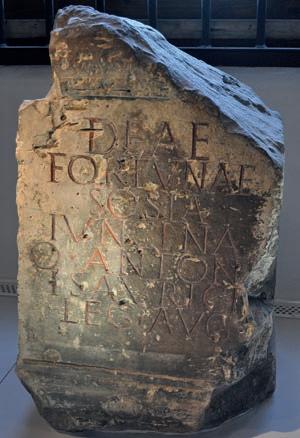
cum and the imperfect subjunctive: page XX
Senior soldiers could bring their households with them on their posting. This altar (discovered in modern York) is dedicated to Fortune and was set up by Sosia Juncina, wife of the legatus Quintus Antonius Isauricus.
1 Some verbs and nouns are closely connected. For example: Quīntus omnēs familiārēs amāre nōn poterat. amor omnia vincit. Quintus was not able to love all his relatives.Love conquers all. mīlitēs clāmāre volēbant. Agricola clāmōrēs audīvit. The soldiers wanted to shout. Agricola heard the shouts.
2 Further examples: verbs nouns favēre to favor favor favor terrēre to terrify terror terror tremere to shake tremor shaking
3 Now work out the words that are missing from this table: timēre to fear timor dolēre (1) to hurt, to be in pain dolor (1)
dolēre (2) to grieve dolor (2)
honōrāre honor honor furere furor rage
labōrāre
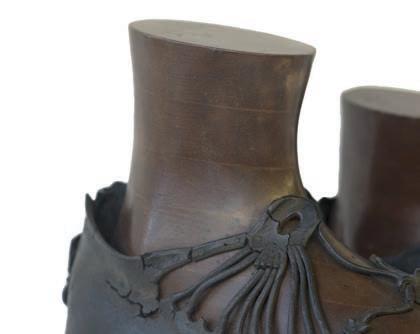
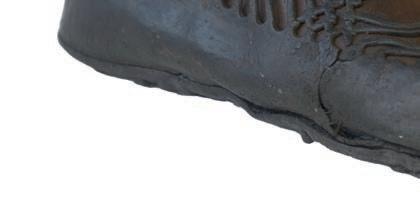
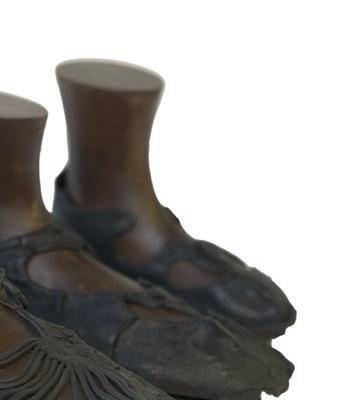

These Roman leather shoes were found at the Bar Hill Roman Fort in modern Scotland. The three different sizes were probably for a man, a woman, and a child.
amor omnia vincit

Quintus helps Rufus come to terms with his feelings of guilt.
Rūfus ad legiōnis secundae valētūdinārium, in quō Quīntus iacēbat īnfirmus, cotīdiē veniēbat. multa dē patre suō rogāvit, prope lectum sedēns. quamquam epistulam Barbillī identidem lēgerat, vix intellegere potuit cūr pater veniam petīvisset.
“cum apud Graecōs sōlus manērem,” inquit tribūnus trīstis, “ad Aegyptum redīre voluī ut veniam ā patre peterem. fortūna tamen coēgit mē invītum per tōtum orbem errāre, sīcut Ulixēm. nam deī, quī nōbīs imperium lātissimum dedērunt, mē ad hanc īnsulam bellicōsam procul in marī dūxērunt. ēheu! sine dubiō decōrum est mihi poenās dare. propter stultitiam meam māter vītam āmīsit, et pater uxōrem.”
cum Rūfus haec dīxisset, Quīntus bracchium tetigit et respondit,
“quis fortūnae resistere potest, mī amīce? cotīdiē nōbīs imminet mors. id quod Plōtīnae accidit tua culpa nōn fuit. amor omnia vincit, ut poēta quīdam dīxit. ita Barbillus, multōs cāsūs passus, ā tē veniam petīvit. ad fīnem parentēs maximē amābāmus, et illī nōs.”
1 Explore the story
a Lines 1–2: what are we told about Quintus here?
b Line 2: whom was Rufus asking Quintus about?
c Look at lines 3–4.
i What had Rufus been reading repeatedly?
5 10 15
amor love
ii Despite what he had read, what was Rufus struggling to understand?
valētūdinārium hospital
identidem repeatedly orbem world errāre wander
Ulixem: Ulixēs Ulysses (Roman name for Odysseus)
bellicōsam: bellicōsus warlike
bracchium arm
imminet: imminēre hang over, threaten culpa fault
cāsūs: cāsus misfortune ad f īnem to the end
d Lines 5–6: what had Rufus wanted to do when he was s taying in Greece on his own?
e Look at lines 6–9.
i How did Rufus compare his fate to the fate of Ulysses?
ii What did Rufus say the gods had given him and his fellow Romans?
iii Where was the location of the island that the gods had led Rufus to?
f Look at lines 9–10.
i What outcome was Rufus suggesting he had deserved?
ii What losses was he blaming on his own foolishness?
g Look at lines 11–13.
i In response to Rufus, what does Quintus say about destiny?
ii What did Quintus suggest was a daily threat?
h Line 13: what did Quintus say was not Rufus’ fault ?
i Lines XX–XX: what was the original line o f poetry that Quintus was quoting?
j Look at lines XX–XX.
i What are we told about Barbillus here?
ii What are we told about the relationship between children and their parents?
2 Explore the language
In this stor y, Quintus and Rufus are talking about serious things and they choose their language carefully to reflect how important these events are to them.
Think carefully about how each character uses serious-sounding words and phrases. Identify two examples from each of their speeches and explain why you think they have chosen these words.
3 Explore further
In this story, both Rufus and Quintus refer to famous poems to try to explain their thoughts to one another. Rufus says that he was like the Greek hero Ulysses when he was forced to wander the world. Quintus quotes the Roman poet Virgil when he talks about love.
Think about why someone might use quotations or well-known references when talking to another person. What kind of impression are they trying to make? How might sharing these things help someone to build a relationship with another person?
Reviewing the language Stage 26: page XXX
The Roman army was crucial for the conquest and control of the Roman Empire. How did legionary fortresses contribute to this?
If the legion itself was like a miniature army, the fortress in which it lived when not on campaign could be compared to a fortified town. The fortress had to accommodate and defend the legion and provide facilities for the daily life of its inhabitants. Remains of legionary fortresses exist all over Europe. No two are identical, but all follow a similar pattern and include most of the same features. When the army moved into new territory, it needed to construct a fortress quickly. Therefore, fortresses tended to be made from wood at first, as this was relatively quick and easy. Over time, however, they would usually be rebuilt in stone.
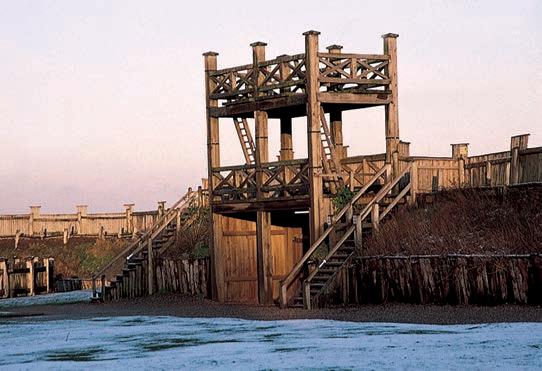
Thinking point 1: Why do you think legionary fortresses all followed a similar design?
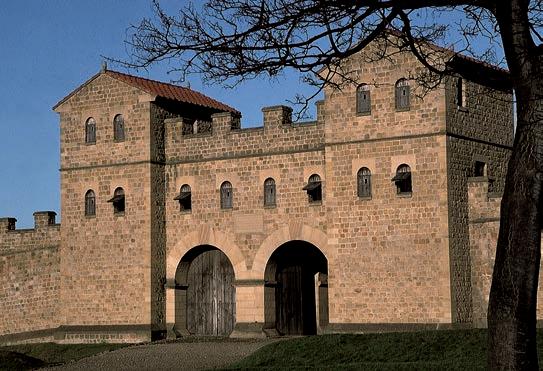
The left picture shows a reconstruction of a wooden gate at a fort in central England (seen from the inside). Right is a reconstructed stone gateway at a fortress used as a supply base for Hadrian’s Wall.
Thinking point 2: What are the advantages of a stone fortress over a wooden fortress?
When a soldier approached his fortress for the first time, he might have felt reassured by the impressively tall walls and 20-foot-wide (6-meter) ditch around the entire perimeter, designed to slow down potential attackers. Towers – one on each corner of the fortress and spaced along the sides – enabled lookouts to spot hostile troops before they could get too close. The only way in or out of the fortress was through one of four gates, which would have been easy to defend.
“Also, take care that gates cannot be burned by res lit near them. To protect against this, cover them with animal skins and iron.”
(Vegetius, de re militari 4.4)



Entering through the main gate, the soldier would walk along a straight road called the via praetōria , to the headquarters of the legion, the prīncipia . The principia was a large and impressive building at the heart of the fortress. A visitor would first enter a courtyard surrounded on three sides by a colonnade and storerooms. On the far side of the courtyard was a large basilica or a great hall, where the legatus worked with his officers, interviewed important local people, and administered military justice. There were also offices where clerks would do administrative work, such as organizing the pay for the soldiers.
The principia also included a small temple (sacellum ), which housed the aquila , the legion’s battle standard. The aquila was an image of an eagle perched with outspread wings on the top of a pole. It was made of gold and in its talons it clutched a bundle of golden darts that represented the thunderbolts of Jupiter.











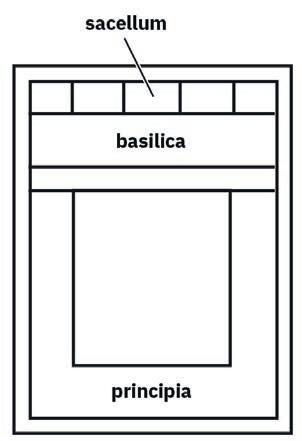
and plan
Thinking point 3: Why do you think the principia was located where it was in the fortress?




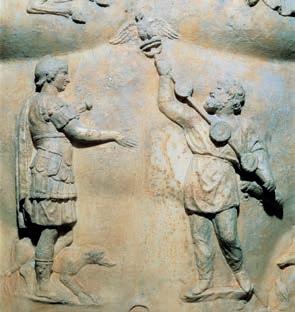
At the Battle of Carrhae in 53 BC the Parthian army defeated the Romans and took several aquilae. In 20 BC the Romans were able to negotiate the return of the aquilae. This was cause for much celebration and is commemorated by this statue of Emperor Augustus.
Clustered around the principia were other buildings that were important for the day-to-day running of the legion.
Horses are valuable, so need to be protected by the walls of the fort. The stables keep them safe, fed, and sheltered.
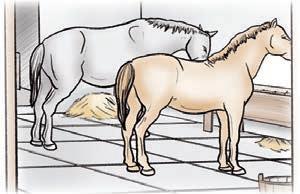
We practice ghting techniques in the large drill hall.
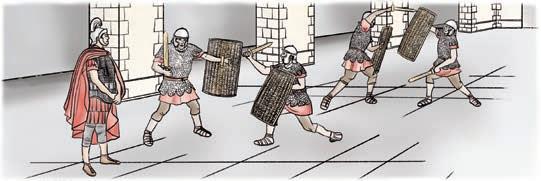
Workshops are used to build things we need, including weapons, armor, furniture, and other day-to-day items.
Grain is the main staple of a legionary soldier’s diet, and granaries ( horrea) keep it dry and safe. A fortress might have several granaries, often arranged side by side in pairs, containing stocks of grain suf cient for at least one year, possibly two. Good ventilation protects against rot, and cats are good for dealing with rats and other vermin.
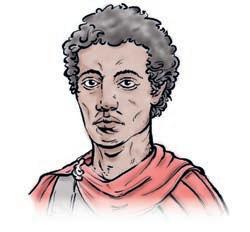
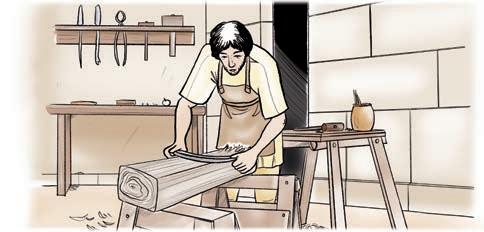
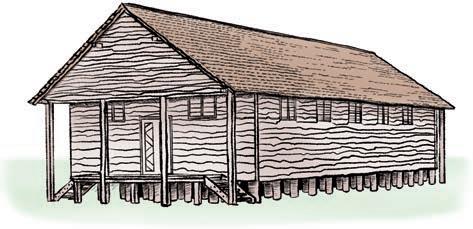
The small prison sometimes houses valuable hostages or prisoners of war. Sometimes unruly legionaries might end up there, but it isn’t for long prison sentences; very badly behaved legionaries are punished by having their wages cut, being beaten, or even being killed!
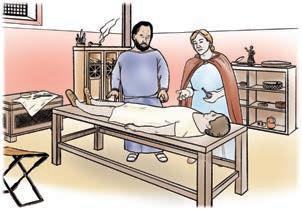
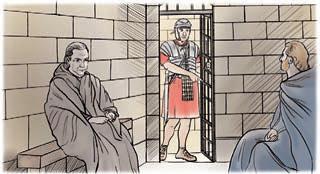
There is a hospital building (valeˉtuˉdinaˉrium) for treating the sick and wounded. The most common illnesses are stomach problems and eye issues. This building isn’t equipped to deal with long-term recovery, though; anyone seriously injured is usually discharged from the army. The medics are well respected and have a lot of opportunity to study the human body; I think they are often actually better than civilian doctors.
Near to the principia was the praetōrium , where the legatus lived. Unlike ordinary soldiers, senior officers such as the legatus were allowed to marry, and their families would have lived with them in the fortress. We can see evidence of their presence in letters and tombstones. The accommodation of the legatus was designed like a luxury villa, including gardens, central heating, and a private bathing complex. The legatus would entertain important local people in his home, and the comfortable accommodation was a show of wealth that could presumably impress or intimidate, depending on the situation.
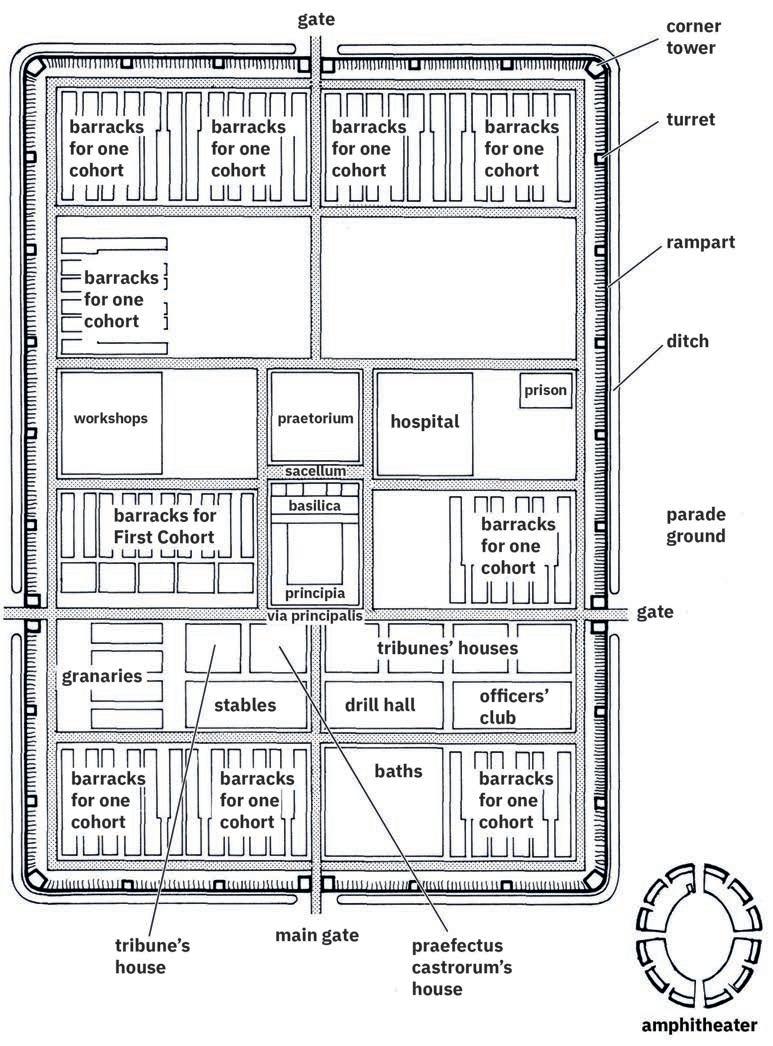
Thinking point 4: What sort of people would have made up the household of the legatus?

A drawing of the tombstone of Fabia Honorata, the young daughter of Aurelia Eglectiane and her husband, Fabius Honoratus, a tribune stationed at Deva in the late second century.
Moving further away from the center of the fortress, the soldier would find his barracks. A legion was made up of 5000–6000 men, each of whom needed somewhere to rest; it is no surprise therefore that the barracks took up most of the fortress. Barracks were arranged by cohort, then by century, then by contubernium (a unit of eight men; there were ten contubernia in a century). Legionaries trained, fought, and lived alongside their contubernium, so it is likely that soldiers came to regard them as family.
Thinking point 5: What do you think a Roman soldier might have liked about living in the barracks? What might he not have enjoyed about it?
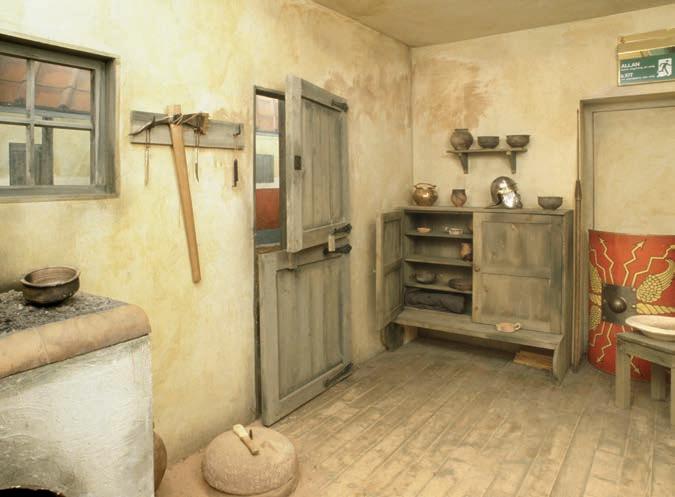
Each contubernium shared two rooms: a bedroom and a communal space which acted as a living room and kitchen. This reconstruction is from the National Roman Legion Museum at Caerleon in Wales.
Thinking point 6: Why do you think the legatus lived in the praetoriumrather than in the barracks?
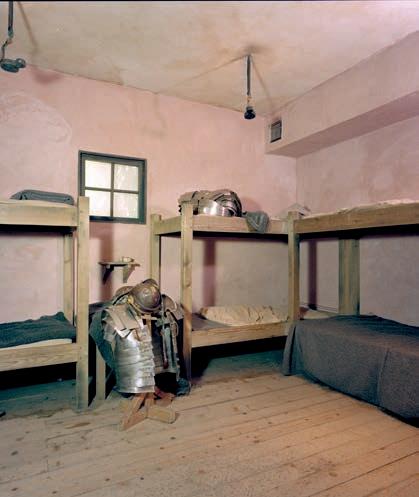
We tribunes have our houses on the via prīncipālis, opposite the principia. They’re not quite as big or as pleasant as the legatus’ house, but they’re not too shabby either! Mine is organized around a courtyard that I use for entertaining guests or when I just want a bit of peace and quiet from the rest of the fortress. My house is much better than the barracks that most of the soldiers live in. I sometimes hear them grumbling about how cramped it can be. I think it’s a good way to motivate them to work hard – if they earn a promotion to centurion or a member of the rst cohort then they can move into nicer accommodation. Not quite as good as mine, of course!

Every fortress also had a bath house. This might have been inside the fortress, or outside by a river or stream. Bathing was important for hygiene, but it also gave the soldiers somewhere to relax. The social aspect of bathing was an important part of Roman culture and a daily trip to the bath house with his friends might have helped a Roman soldier to feel connected to his cultural identity, even if he was stationed hundreds or even thousands of miles from home.
Thinking point 7: Almost all Roman baths throughout the empire were heated in the same manner. Think back to Unit 1: can you remember how the Romans usually heated their baths?
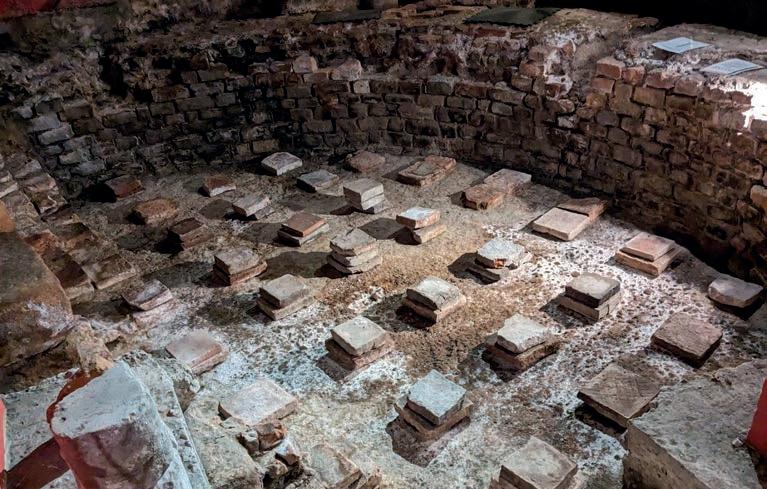
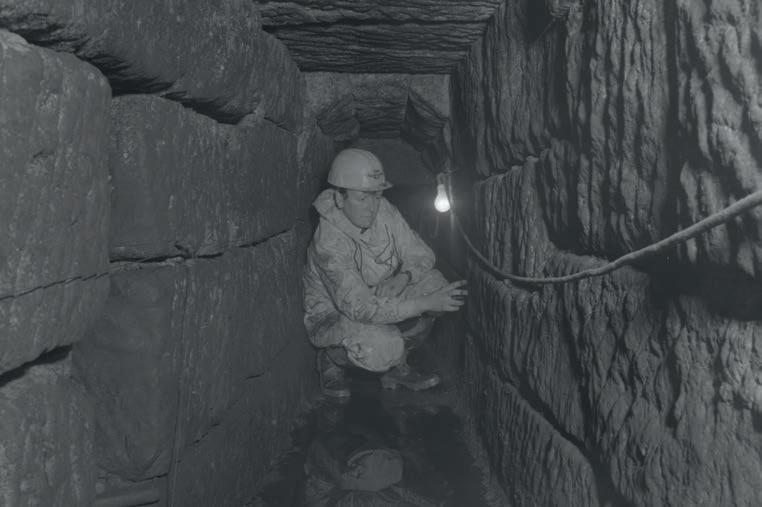
The remains of a fortress bath house were found in the cellar of a pub in York (Roman Eboracum). The bath house was originally built sometime between AD 71 and AD 122 by the Ninth Legion.
An archaeologist inspecting the Roman sewer which served the legionary bath house at Eboracum. Objects such as small glass and bone playing counters, gold beads, and gemstones from rings were found in the soil of these sewers: probably lost by people using the baths.
Poor sanitation and failure to clean up toilet waste could lead to disease, not to mention unpleasant smells! Therefore, there were toilets positioned throughout the fortress. These resembled benches containing holes; they were positioned above running waterto “flush” the waste away.
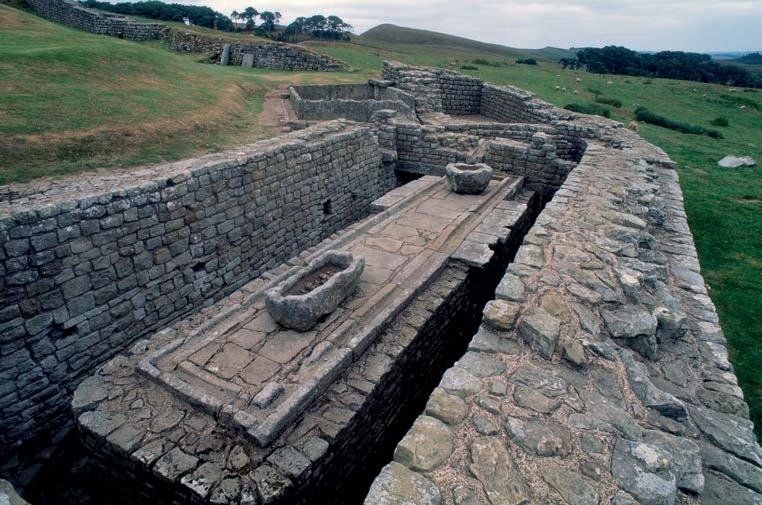
The remains of the toilets at Housesteads Roman Fort on Hadrian’s Wall. The men might have sat side by side, maybe having a chat, and rather than toilet paper many used (and shared!) a sponge on a stick that was washed between uses.





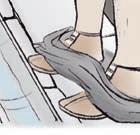

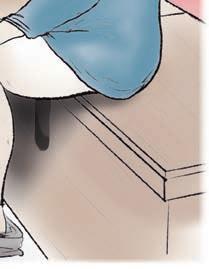
Outside the fortress walls would be an amphitheater, very similar to those one might find in a Roman town. This provided a space for ceremonial parades, or for the legatus to address the entire legion with a speech. It could also be used to demonstrate tactics and for weapon training. The amphitheater at Deva is the largest known in Britain.
Thinking point 9: How do you think local civilians might have felt about the presence of a legionary fortress nearby?
Thinking point 8: Why might the amphitheater be located outside of the fortress?
The Roman army was crucial for the conquest and control of the Roman Empire. How did legionary fortresses contribute to this?
You may wish to consider the following:
• the standardized design of fortresses and their construction
• defensive features
• the living conditions and locations for different types of soldiers and officers
• facilities and amenities.




amor, amōris, m.
love auferō, auferre, abstulī, ablātus
take away, carry off, steal bellum, bellī, n. war commōtus, c ommōta, commōtum alarmed, excited , upset doceō, docēre, docuī, doctus teach dum while; until lēgātus, lēgā tī, m. commander; governor legiō, legiōnis, f. legion magnopere greatly, very much nōtus, nōta, nōtum famous, well known num whether patefaciō, pat efacere, patefēcī, patefactus reveal quantus, quanta , quantum how big, how great quo t? how many?
refer ō, referre, rettulī, relātus carry, bring back, tell, relate sī if testis, testis, m.f. witness ut that, in order that vester, vestra, vestrum your (plural) virtūs, vir tūtis, f. courage, virtue
